Below are the 100 best songs of 2017 as chosen by the Noisey staff. Listen to them on Apple Music and Spotify. See also: The 100 Best Albums of 2017.

Carly Rae Jepsen is the apple of pop’s eye and “Cut to the Feeling” was her only solo release of 2017, meaning it bore great expectations on its neon pink shoulders. It’s a skyscraper of a song that both describes and enacts the modus operandi of pop music as an entire project, rising so high with every new chorus that you’re dizzy by the time it’s done. It’s best heard in a sweaty room with a bunch of other people who’d quite like to cut to the feeling too. —Lauren O’Neill | LISTEN
Videos by VICE
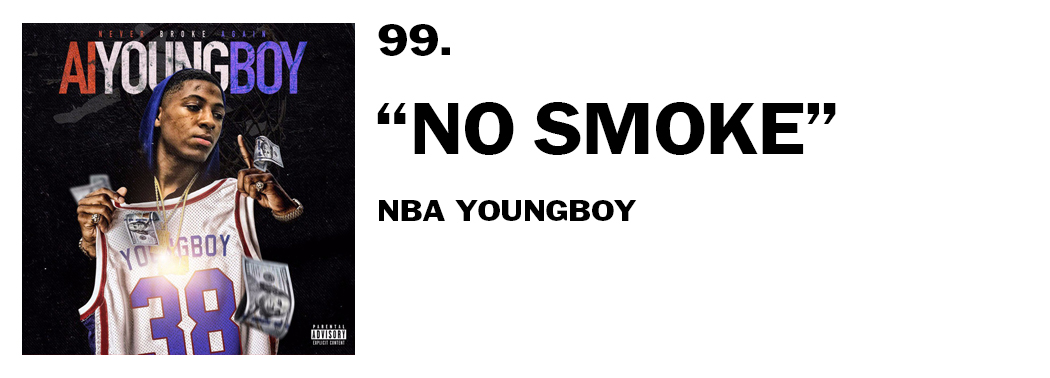
There’s a feeling of optimism and invincibility associated with adolescence. In American culture, we get drunk off of it—even when most of us have long passed that period in life. It’s part of the reason why YoungBoy Never Broke Again is so irresistible right now, and “No Smoke” is AI YoungBoy’s culmination of those qualities. Here, the 18-year-old Baton Rouge rapper has his eyes set squarely on freeing his family from financial and environmental strife, charging wide-eyed and full speed into the opposition’s violent attempts to curtail his plans. And from the fury with which he raps, you can tell his means every word of it. —Lawrence Burney | LISTEN
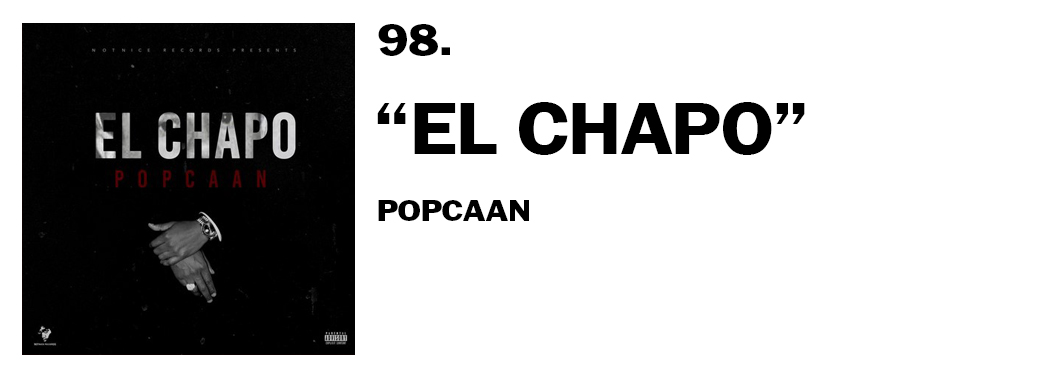
Popcaan’s music most often explores just a few topics: upgrading your lifestyle, sweet-talking women, and knocking people’s heads off, if necessary. He largely works in the latter mode on his single “El Chapo,” in which he details the different weapons he’ll use to get rid of enemies, much like the Mexican drug lord the song is named after. But because of Popcaan’s uncanny ability to switch from guttural assertions to nasal quips in seconds, murder don’t sound so bad. —Lawrence Burney | LISTEN
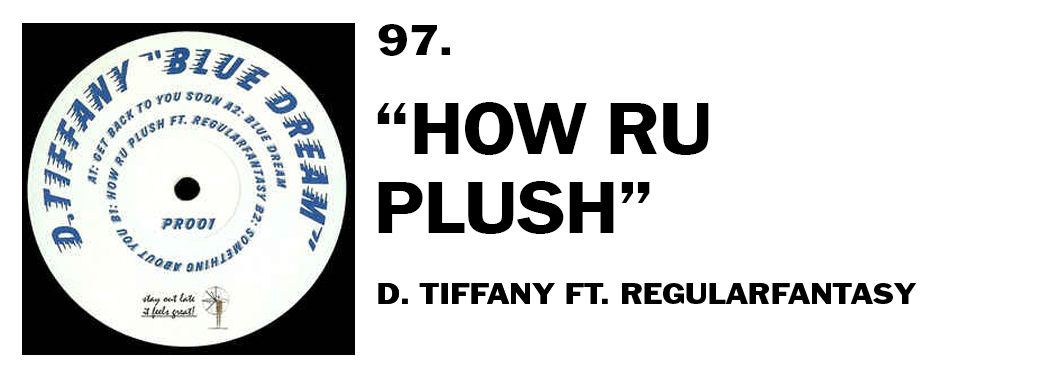
Because the club scene needed its own “Sweater Song,” D. Tiffany paid tribute on this EP cut to the eye-glazing mundanity of dancefloor small-talk. Over a woozy ambient-house track—with skittering hi-hats, tumbling drums, and featherlight pads—a dazed voice employs a few stock phrases: “Excuse me, thank you, pardon me, I’m tryna dance. How are you? I’m good!” It’s the sorta stuff you’ll undoubtedly find yourself uttering a few drinks deep in a darkened room, attempting to quickly end a conversation with a friend’s ex so you can get back to the ecstasy—which “How RU Plush” eventually does. —Colin Joyce | LISTEN

We’ve all traveled with drugs, but “Mega Bus” isn’t about bringing weed home for Christmas break on a Greyhound. It’s Peewee’s “Gone Till November.” MPA Turk and Quavo feature on the Lil Mister production, that with cries of “All my mama used to say was, ‘Son I pray you make it back,’” and advice like “Young nigga don’t spark up that L. With that smell, you might as well tell,” are a TED Talk on how to be a successful kingpin. And if you get caught, per Quavo’s advice, do a show for the prosecutor’s kids to get the charges dropped. —Trey Smith | LISTEN
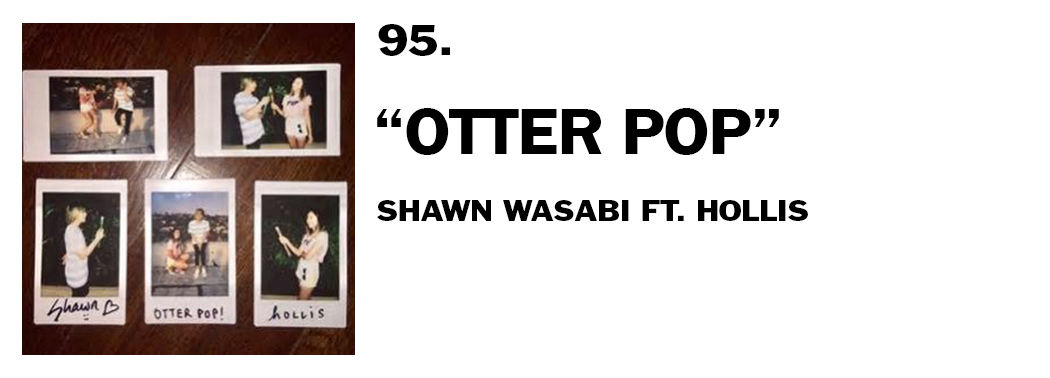
Shawn Wasabi’s latest single is a buffet of sensorial delights if you’ve got a taste for things that are sweet and sharp. There’s references to all things sugary in the blissfully nonsense lyrics—cake, Tropicana juice, coconuts, calamansi, lemon drops, and jello shots all make appearances, as do the neon treats that give the song its title, otter pops—and the song’s pitch-warped vocals and revved-up piano house breaks are as close to pure glucose as anything that’s been released in 2017. Go ahead, treat yourself, you deserve it. —Colin Joyce | LISTEN
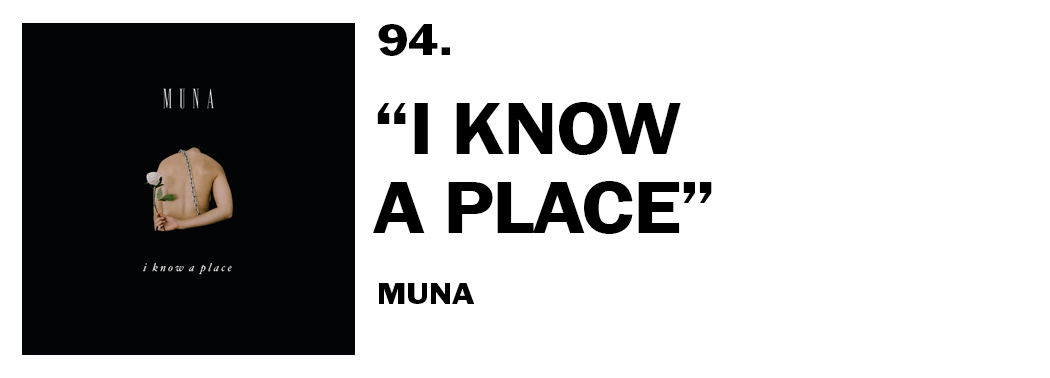
When MUNA play this song live, vocalist Katie Gavin introduces it as their imagining of an ideal world we should all be working toward—one where people aren’t persecuted for being who they are. So far we’re doing a pretty shit job of things, but with this hopeful burst of synth-pop, the Los Angeles trio has built a sanctuary in which it’s possible for marginalized people to let go and wile out like Kevin Bacon in Footloose. It’s essentially the “San Junipero” episode of Black Mirror set to a four to the floor beat; choosing love over hate, liberation over fear. —Emma Garland | LISTEN
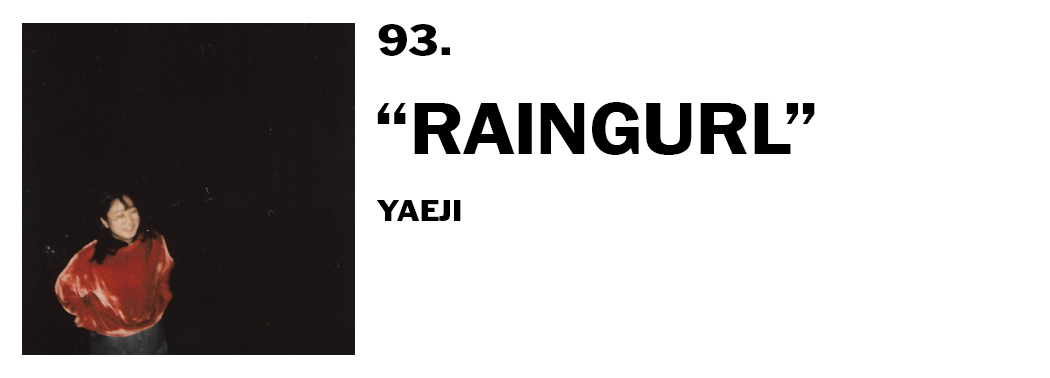
Hopscotching across the border between house, club music, R&B, and dreary-eyed rapping, this omnivorous single by the New York producer Yaeji provides a utopian vision of what the dancefloor can be in 2017. Familiar in the grammars of different genres (and languages: she sings in both Korean and English), walls between niche scenes and styles come down as Yaeji, drink in hand, offers permission to rage in stuttered speak-sing: “make it rain, girl, make it rain.” Cue the fog machine, cue the drums, lose yourself for a bit. —Colin Joyce | LISTEN

If you imagine pop music as a kind of chemistry, as a sum of elements that have been blended in a very precise way to create something new, Rina Sawayama’s “Afterlife” is the final product in its purest, most perfect form. That glittering falsetto, those vivid, meticulously crafted hooks. That classic key change. The winking scatter of throwback references. And somehow, somehow, none of it feels too much. It’s still cool. Rina has discovered the right formula. —Daisy Jones | LISTEN
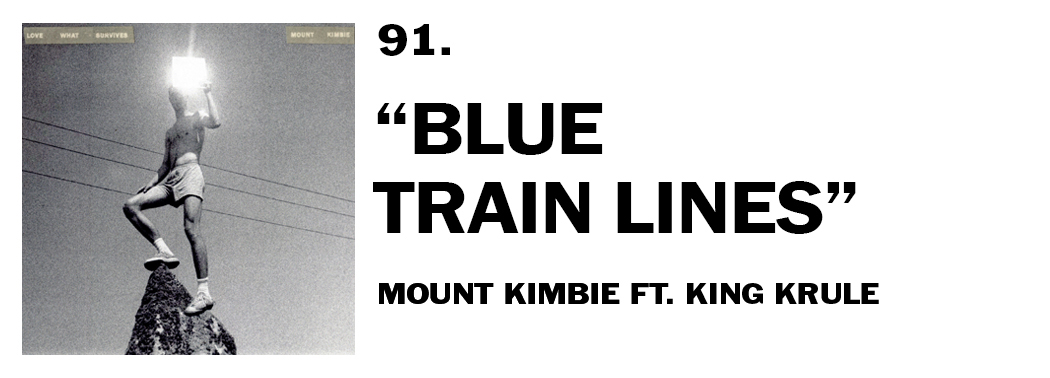
“Blue Train Lines” is panic. Leading with the shake of frantic hi-hats, it’s scrambling, it’s urgent, and it feels like it’s building something that it never gets to. King Krule wails over the gritty drum and bass, conjuring up images of grimy trains running down subway tracks and blood coursing quickly through veins. “I might have seen it all,” Krule howls. At one point, he just screams unintelligibly. “Blue Train Lines” is the sound of a screeching train and a heart beating faster and faster. It’s complete chaos. That’s exactly what makes it exciting. —Leslie Horn | LISTEN

Sam Wise’s “Lizzie” is a British rap track that sounds as free as the blue sky that appears throughout its video. The song’s a cheeky, charismatic flex, bouncing “like Tigger” through bar-after-bar-after-bar. If anyone in the UK is next up, Sam Wise is a good bet. He says it himself, “Lately I’ve made some serious moves and it’s just fantastic.” —Ryan Bassil | LISTEN

With everything wrong with the world on public display in 2017, Perfume Genius’ No Shape is a shining example of everything right in it. On the album’s first single, “Slip Away,” a promise is made: “Oh love, they’ll never break the shape we take.” It’s an invitation to drop everything and run for the hills together. To a lover, perhaps forbidden, Hadreas urges: “Baby, let all them voices slip away.” It plays like a tribute to queer resilience past and present, a testament to everything overcome, and a beacon of promise for the future. —Tiffany Wines | LISTEN

At first listen, it could seem as if the Philly rapper Tierra Whack is taking a subtle jab at her mumble rap contemporaries with the marble-mouthed hooks on “Mumbo Jumbo,” but in an interview earlier this year, she revealed that she hums the loopy melodies of all her songs before adding lyrics. The melody here was so good that she decided decipherable words weren’t even necessary. Good call. —Lawrence Burney | LISTEN
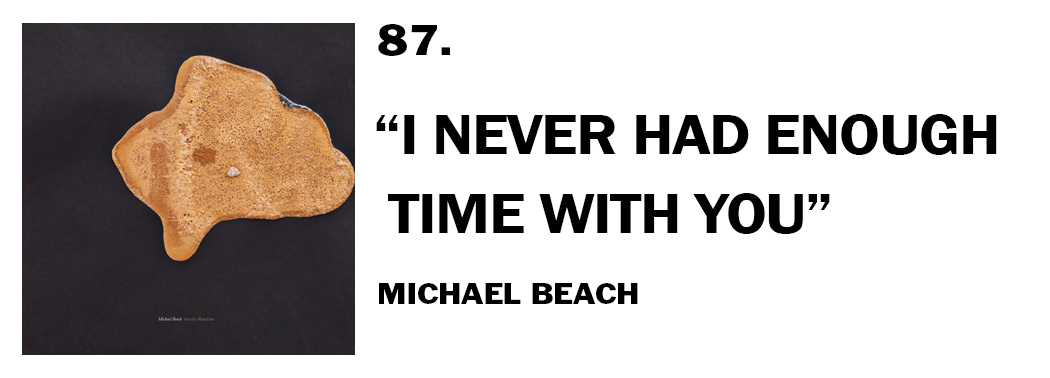
There’s something in the way Michael Beach sings,“I never had enough time with you” that lingers. Dripping with loss, hurt, and elusiveness, it also contains an element of hope. Over an 18-wheeler of a guitar riff, the Melbourne-via-Oakland guitarist, delivers a song that seems to say “I’m gutted that you are gone but I have faith that we will meet again.” —Tim Scott | LISTEN

The release of this song—with its stormy production and gossamer vocals—was one of this year’s moments, a rare statement that gives as much away about SOPHIE as it leaves the listener to imagine exactly what the future will hold for her. As one commenter on YouTube summarized: “sophie finally steps out of the shadows and we’re all crying.” In any other case, this would be hyperbole, but seeing the once-faceless producer completely exposed and whisper-singing about tears makes the comment feel surprisingly poignant. —Ryan Bassil | LISTEN

Laura Marling intimately knows how her guitar serves her and the wisdoms she lays upon us in her lyrics, but her strength is in pushing that, and us, forward into spaces we don’t yet know. On “Soothing,” from Semper Femina, Marling digs into the tension of sensuality. She sings of a back-and-forth, of banishment, but the guitar twang and deep, cheeky bassline suggests otherwise. It’s a game we have all played: seduction may linger even when we don’t want it, but, as Marling sings, it can’t come in anymore. —Sarah MacDonald | LISTEN

Since dance music is a largely instrumental genre, the best songs figure out how to get maximum impact out of just a few words. In the case of the Blaze’s “Juvenile,” the short hook—“Let me show you something, you were in my head once”—repeats around and around again, like a lost memory of something that can no longer be reached, or a dream that never happened. It’s a desperately sad song that somehow manages to be as euphoric too, as every banging club tune should be. —Ryan Bassil | LISTEN

The story goes that Kwaye played his music to an Uber driver in Los Angeles who, by chance, happened to have connections to the music industry and got him a record deal almost immediately. Listening to “Little Ones,” you can understand why. Part Prince, part Sade, part 1980s synth-pop deep cut you’d desperately try to Shazam in a sweaty basement club at 4 AM, it’s the sort of mass-appeal song you’ll send to everyone you know until they tell you to stop banging about them already. This track is the result of somebody with really good taste taking all their influences, spinning them into pure, neo-funk gold and pushing them face-first into the future. —Daisy Jones | LISTEN
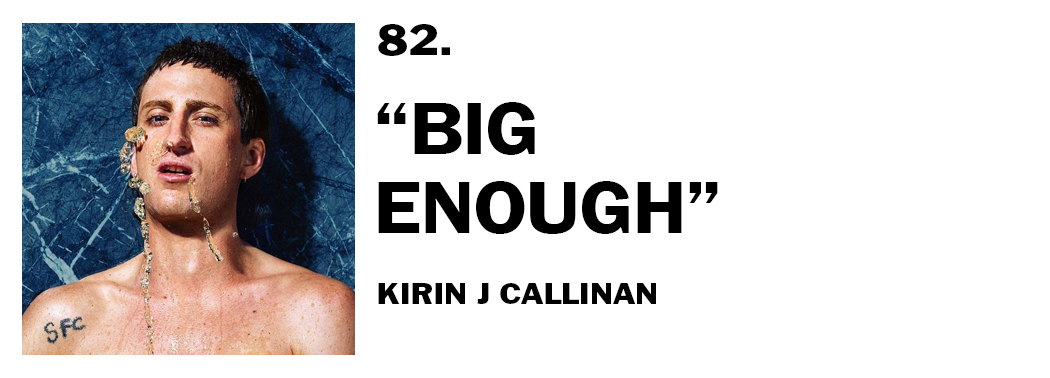
It says a lot about “Big Enough” that Australian rock veteran Jimmy Barnes’s show-stealing, meme-famous screams are even stranger in context. The song’s the zenith of Kirin J Callinan’s irreverent vision, bouncing between hushed balladry, spaghetti western whistles, and blitzkrieg EDM. It does so much with such profoundly mismatched parts that it might read as mere fucking-around, but as Callinan and fellow Aussie weirdo Alex Cameron shout out basically every single country in the world, (including both Koreas) the madness of “Big Enough” begins to resemble optimism. —Phil Witmer | LISTEN
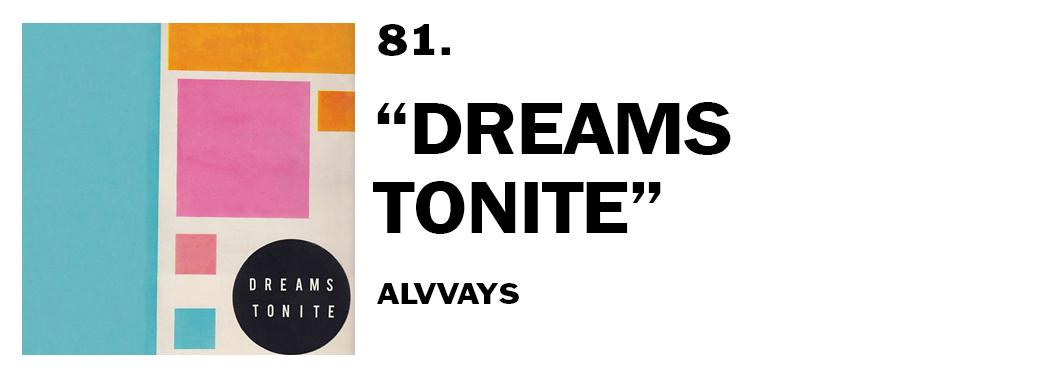
Alvvays are very good at putting sound to fantasies, whether they are good moments or somber ones. On “Dreams Tonite,” an aching track from Antisocialites, Alvvays conjure up a sound that is a golden hour glow with cotton candy-colored skies: inherently fleeting, a bit sad, but beautiful nonetheless. Molly Rankin’s voice glides over top tender guitar strums as she sings, “Live your life on a merry-go-round / Who starts a fire just to let it go out?” Hope dominates “Dreams Tonite,” though, even if woven throughout is the reality that whatever your heart yearns for at this moment, whichever person it is, won’t work out anyway. —Sarah MacDonald | LISTEN
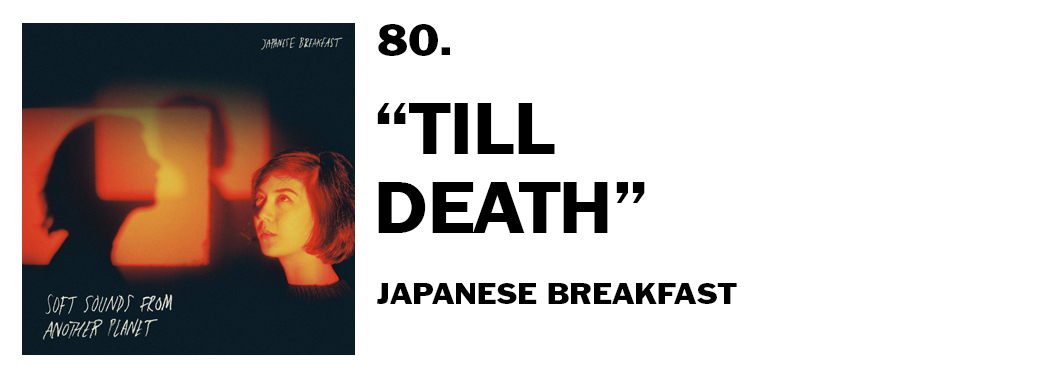
“All our celebrities keep dying / While the cruel men continue to win” is the most succinct recap of 2016 and 2017 you could ask for. Instead of couching these sentiments in angry punk, Japanese Breakfast leader Michelle Zauner performs “Till Death” as pure 70s schmaltz. It’s a bold move and Zauner goes for it, building from a solitary Rhodes piano to an extraordinary final key change festooned with horns, wedding bells, and choral backing vocals. “Till Death” is an honest, beautiful song about finding peace amidst chaos, and the most romantic phrasing of the word “thanatophobia” you’ll ever hear. —Phil Witmer | LISTEN

When you mix knowingly hollow pop storytelling with a drop which feels like you’re being whirled around a particularly merciless (and weirdly sexy?) candy floss machine, you get “1UL,” a frankly outrageous offering from Danny L Harle, king of the PC Music eccentrics and purveyor of the best airhorn noises anywhere. While there’s probably something enlightening to say about its pastiche of dance music, to intellectualize would be to miss the point a bit, because for all “1UL”’s cleverness, it also just absolutely fucks, and is easily the closest humanity got to achieving the power of flight all year. —Lauren O’Neill | LISTEN
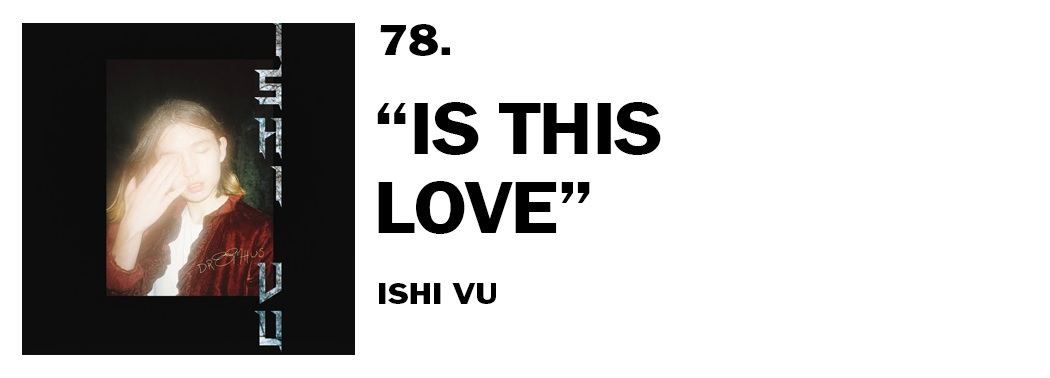
The name of ishi vu’s May EP on Studio Barnhus translates to “dreamhouse” which is a pretty fitting descriptor for the otherworldly joy of its standout track “Is This Love.” Indebted to two generations of swooning Swedish producers—both the hazy bliss of post-Balearic acts like Air France and out-there house producers like Barnhus boss Kornel Kovacs—”Is This Love” warps and stretches samples from Bob Marley and Eazy E into an oxygen-rich synth cloud that hangs somewhere in the atmosphere above the dancefloor. —Colin Joyce | LISTEN

London’s Stefflon Don has had a phenomenal year, though that’s hardly a surprise when she began it by releasing “Real Ting (Remix)” featuring UK rap kingpin Giggs. The track is an apt showcase of Steff’s glittering lyrical dexterity and bombastic star quality, and—for those unfamiliar with her Real Ting mixtape, which came at the end of 2016—“Real Ting (Remix)” announced her as an important and talented new player in British music, a status she’s proved herself worthy of throughout 2017. —Lauren O’Neill | LISTEN

Khalid become one of this year’s most celebrated artists for the elegant generational snapshot that is his debut American Teen, a reckoning of love, technology, and the uncertainty of growing up. “Saved,” a song about keeping his ex’s number stored on his phone, hits at the sweet spot between them. But it also feels instantly familiar in both style and substance, regardless of when you grew up. And that’s Khalid at his best—an artist who uses contemporary vernacular to hit at something more plainly human: the challenge and grace of letting someone go, and the pieces of them that remain with us in love’s wake. —Andrea Domanick | LISTEN

If you don’t think Gucci Mane still has it then you’re a whole-ass idiot, and this song would be evidence presented against you in court. This is vintage Gucci, but that being said, he’s not the highlight. Whenever you invite a Sremmurd on your song, they’re going to steal the show. Few people can write a hook or rap like Jxmmi, so thank God Gucci had him do both. He rhymes “soccer team” with “Socrates” for fuck’s sake. —Trey Smith | LISTEN
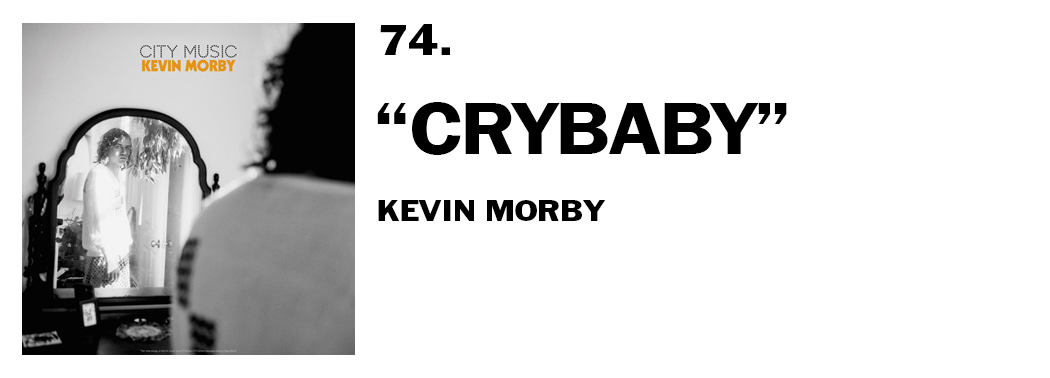
Morby wrote this song with his Babies bandmate Justin Sullivan, and the project’s lo-fi fingerprints are all over it. What makes it really hit, though—besides that driving hook—is its defiant solitude, a theme that underscores all of this year’s excellent LP City Music. Morby wrote the tune in 2013, but he picked an apt year to finally put it out: it’s a song about feeling disconnected from the world you live in, but having to live in it nonetheless, and the vulnerability and exhaustion that comes with it. Sometimes, you gotta cry, crybaby. —Andrea Domanick | LISTEN
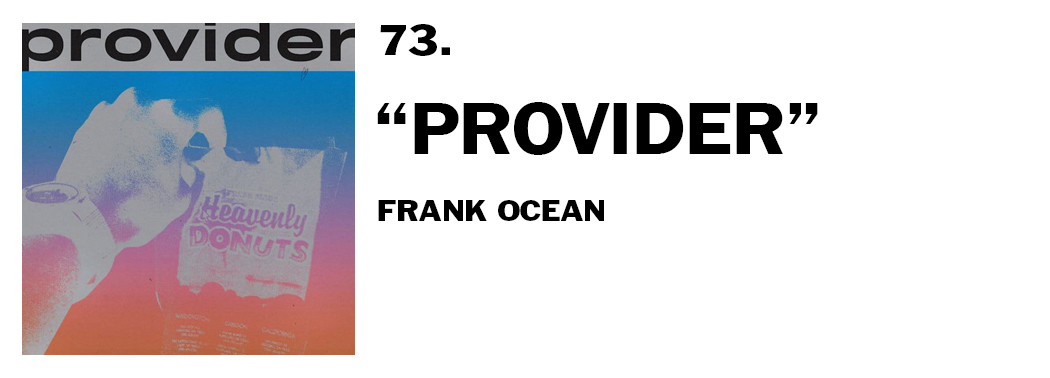
One minute, 22 seconds. That’s the exact mark in which “Provider,” one of a few lovely loosies that Frank Ocean released in 2017, goes from Good to Great—from a nice melody to something more weighty and transcendent. The beat drops and it almost sounds like someone’s leaned on the rewind button for a second, emptying into a sort of weightless beauty with silky keyboards orbiting Planet Frank. There’s an Aphex Twin joke, a few stray raps, and a beautiful octave-jumping vocal run, but the short statement that kicks off this 30-second reverie sticks in your brain throughout: “Tonight I might change my life.” Even at his most personal-sounding, Frank Ocean’s always been an adept talent at tapping into the universality of human emotion, and “Provider” is just another reminder of how true his soul speaks to the lot of us. —Larry Fitzmaurice | LISTEN

Though coyotes are not native to New Zealand, the haunting vocal howl on “I’m Not Cold Anymore” almost sounds like one. From their Dunedin home, brothers Jeremy and Louis Potts produce brilliantly off-kilter slacker rock, crafted from GarageBand and accompanied by a video about creating your own fun. If you find yourself looking for a soundtrack to wander the forest of southern New Zealand while painting faces on rocks and hanging out under bridges, this is it. —Tim Scott | LISTEN
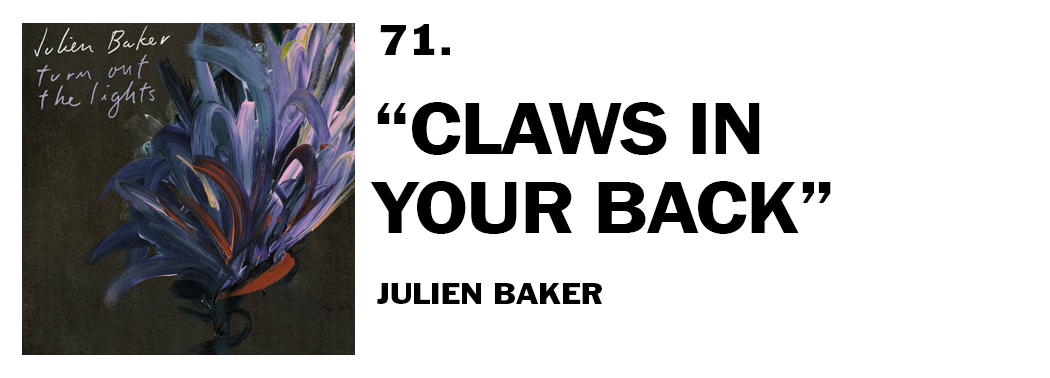
Consider someone you love dealing with depression. Consider how insidious that sickness can be but that you love them no matter what because, ultimately, this is one part of who they are. Consider patience and kindness. Julien Baker considers this on “Claws in Your Back,” an unbelievably beautiful, swelling piano ballad from Turn Out The Lights. “I think I can love the sickness you made,” Baker sings hopefully. “Claws In Your Back” lingers in the darkest moments, but remains optimistic. At the end, Baker sings profoundly of strength, of coming out to see the light and wanting to stay. —Sarah MacDonald | LISTEN
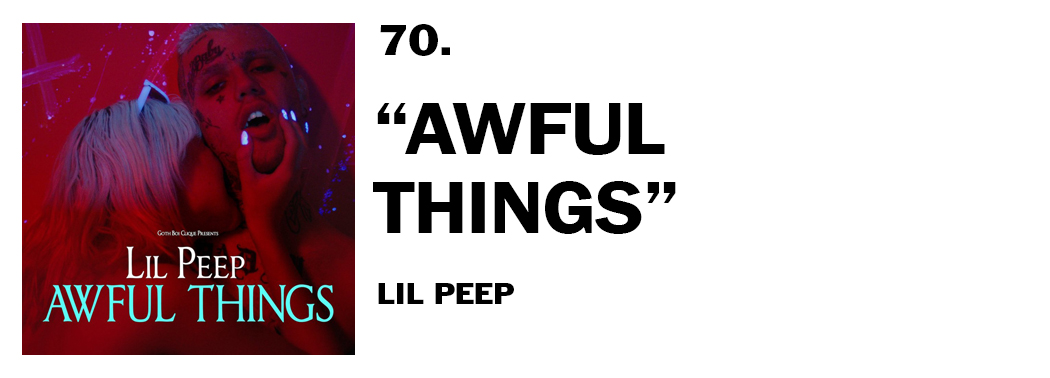
After growing up on the dueling bombasts of mid-aughts emo and Gucci Mane’s early hits, Lil Peep developed a penchant for writing anthems. “Awful Things” is one of his best—a banger about the ways that a loved one’s annoying quirks can make leaving them behind a lot easier, which is funny and endearing in a way that people don’t often associate with his music. The complicated joy is probably part of why it’s the song people have latched onto in the wake of his tragic death—it debuted at 79 on the Hot 100 in the week after he died and his “biggest influence,” Good Charlotte, prepared a cover for his memorial—but it’s also just because he finally channeled his mix of disparate influences into a perfect pop song. A common refrain in the weeks since his death was that Peep was supposed to be playing stadiums, sooner rather than later. “Awful Things” would have been the encore. —Colin Joyce | LISTEN

Pusha T told Zane Lowe that Damon Albarn conceived Humanz—Gorillaz’s eclectic, twisted dance return—as a party for the end of the world in the event of Trump’s election. Somehow, we’re still here with a pounding headache, but nothing at this nightmare rave goes as hard as its opener “Ascension.” Vince Staples’s urgent bars on escapism, racism (“You can live your dreams long as you don’t look like me”), and war make everything spin on top of manic synths by Albarn and Anthony Khan. Staples’s call to party is irresistible at a time when calls to action feel useless. —Jill Krajewski | LISTEN
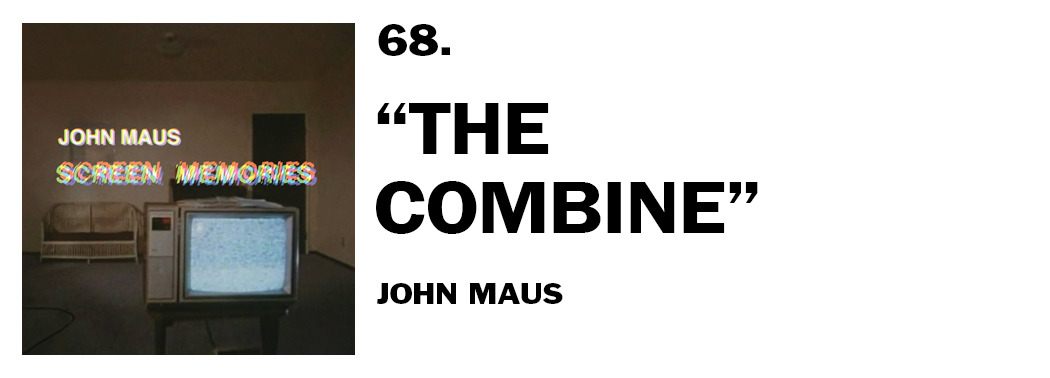
In the wake of all the apocalypses knocking at our door, John Maus said earlier this year that he was worried that his end-times synth-pop jam “The Combine” might have ended up a little too on the nose. Over the OMD-Plays-Bach bombast of its interlocking synth lines, Maus sings of how some big mechanical beast is going to come and “dust us all to nothing.” He explains in interviews how the world is always ending in some way or another if you look at things on a long enough timeline, but this year in particular it felt right to hear a man scream about how we’re all gonna die. Eventually. —Colin Joyce | LISTEN
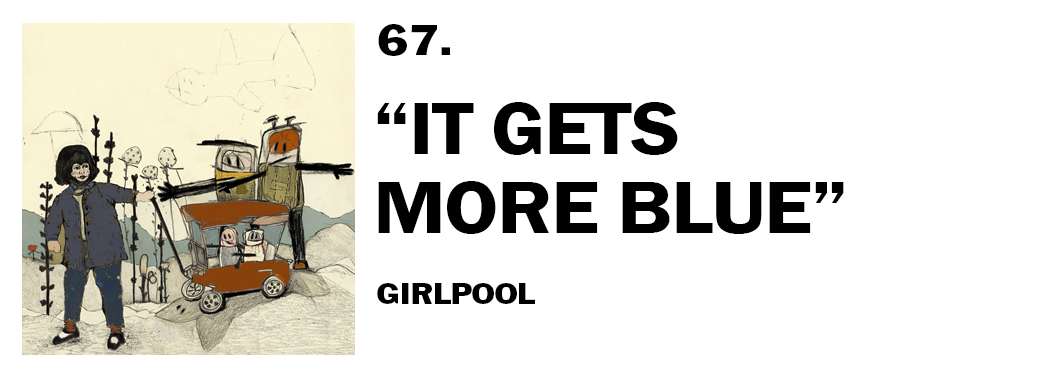
Girlpool often tap into a particularly 90s form of shambling nostalgia on It Gets More Blue, but nowhere more powerfully than on the album’s title track. The song is almost unbearably wistful with Cleo Tucker and Harmony Tividad’s guitar and bass wind through and around each other’s melodies like bikes on leaf-strewn streets. Vignettes about global warming and digging through trash meet a fuzzed-out, grungy chorus that feels blissful even as it snarls, flexing the group’s newfound musical muscles. Songs like this that can be both comforting and moody are a rare gift. —Phil Witmer | LISTEN
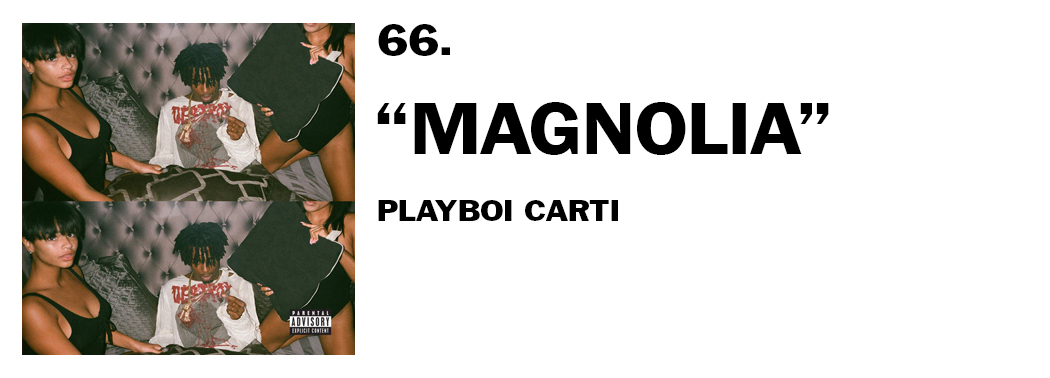
With arguably the catchiest song of the last 12 months, “Magnolia” is proof that Playboi Carti has a long career ahead of him, both as a musician and cultural icon. There was a period in the middle of the summer when it was nearly impossible to go anywhere without hearing this song—whether through car windows, DJ nights, or other commuter headphones—and it had the entire world feeling like New York City. Plus, yo, Pi’erre Bourne came out here with the best producer drop of the year. —Eric Sundermann | LISTEN

Olympia, Washington’s indie supergroup CCFX features vocalist Mary Jane Dunphe, from hostile punks Vexx and duo CC Dust, and Chris McDonnell, from drum-machine-backed goth-rock outfit Trans FX. (Both are also involved in country-rock act The Country Liners.) “2Tru” sees Dunphe channelling gloomy 80s dream pop. The vocals of Robert Smith come to mind, but more if The Cure was a shoegaze band. As she sings about fighting the ocean you can almost feel the Puget Sound mist floating by. —Tim Scott | LISTEN

This song, a Kurt Vile rework from Courtney Barnett’s 2013 record How to Carve a Carrot Into a Rose, will curve any doubts you’ve had about the glory of the guitar. Vile fills the track with his signature droning, a slow rolling wave that moves at a glacial pace. What makes both of these artists such good songwriters is how unafraid they are of leaving some space in a song, trusting the listener to understand the importance of a jam. Vile’s music always has the ability to amplify whatever mood you’re in—joyful or depressed—and “Outta the Woodwork” is one of his finest achievements. —Eric Sundermann | LISTEN
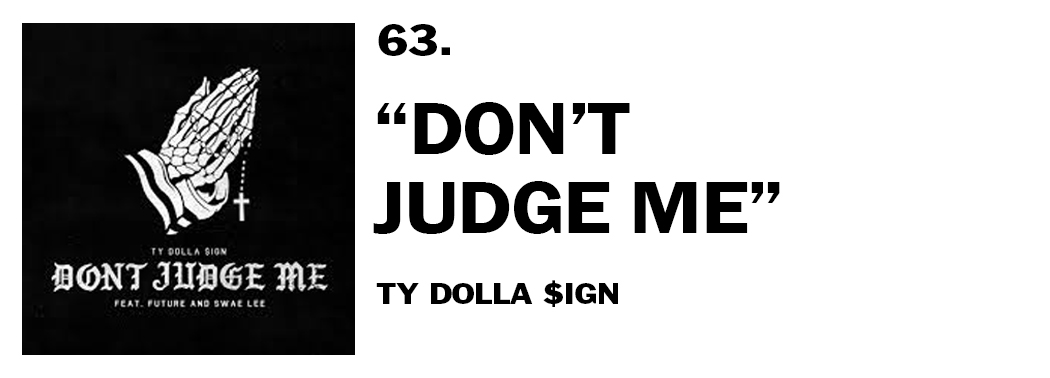
It’s easy to respond to any criticism, however measured, with a brash “Don’t judge me.” Ty Dolla $ign even made it the hook of his Beach House 3 standout, which features cameos from superfriends Swae Lee and Future. On this endearingly low-key party anthem, it asserts itself as a laissez-faire philosophy—justification to live and let live, to drink and revel, and to get yourself five tables at hibachi when the mood hits. —Leslie Horn | LISTEN

So Sydney’s Bed Wettin’ Bad Boys are all grown up. Well, as grown up as a band called Bed Wettin’ Bad Boys can be. Rot, the follow-up to their 2013 debut LP, has the group maturing, if only by a bit. Album highlight “Plastic Tears” features Nic Warnock holding down some hoarse and emotive vocals and a guitar line that The Replacements’ Bob Stinson would be proud of. —Tim Scott | LISTEN

Of all the years LCD Soundsystem could’ve returned with more anxious dance rock, 2017 is all too fitting. Sure, calling an album American Dream may be a little too on the nose, but LCD’s defeated synth doo-wop “american dream” is a clever rumination on the wake-up that really follows an all-out bender. It’s sex without love, acid without the high, age with wisdom, and experience only gained through regret. As much as Murphy’s sadness here is personal, the drawn-out collapsing electronics of “american dream” end up scoring our collective hopelessness as well. —Jill Krajewski | LISTEN

Have you ever noticed how Syd’s voice sounds like a feather? Delicate, subtly complex, and belied by power—and when it brushes over you, it leaves your hair standing on end. No song on Fin captures this better than “Body,” a blush-inducing jam that sees Syd’s whisper-sung vocals cast atop, around, and inside a classic R&B beat, one that sounds increasingly distant behind her. Maybe that’s intentional production, but it’s just as likely the way she naturally fills the spaces in between as she delineates her desires, commanding not with aggression, but tenderness. We can’t help but give in. —Andrea Domanick | LISTEN
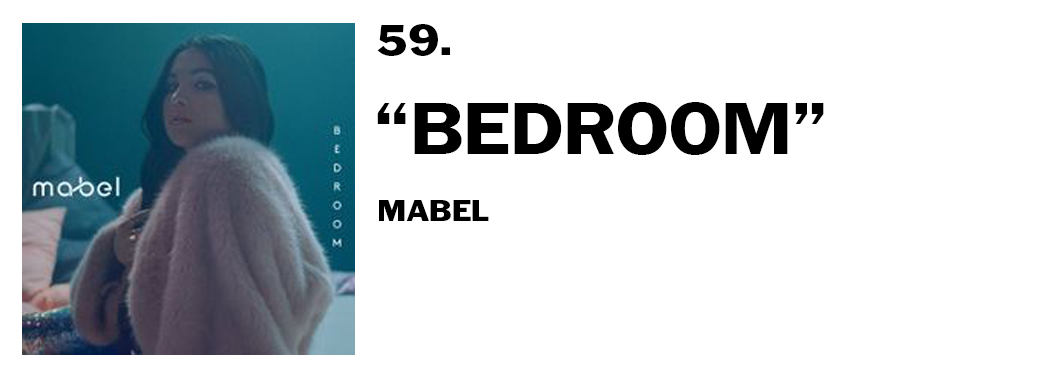
It’s just hit 1 AM and you’re on your way to call things off with that person you’re still fucking even though you know they’re not good for you. You’ve queued up this song again to channel that empowering stuff about smashing their glass because they won’t commit to anything beyond a hook-up. Big mistake: Mabel’s glossy pop-R&B hit is ostensibly about being addicted to make-up sex and so it won’t help you shake this person off. But it’s a banger with an absolutely huge chorus. You win some and lose some. —Tshepo Mokoena | LISTEN

This song still feels like a miracle. You have Calvin Harris, EDM majordomo, getting extremely “real music” on everyone’s asses with warm keyboard tones, rubbery bass, and a mid-tempo gait that hits somewhere between Rihanna’s “Desperado” and whatever song they dance to in groups at weddings now. You have Migos, who at this point probably have done enough in 2017 to sound positively overexposed, running game all over Harris’s low-humidity musical creation like a rabbit let loose on a football field. And you have Frank Ocean—Frank Ocean! This guy almost never sounds good on other people’s shit—or this good, at least—but he’s hook-man supreme on “Slide,” giving his glow to a truly communal song at a point in his career where he’s worked best exploring the limits of solitude. It’s great to talk about what makes “Slide” great, but you know what? It feels even better to just listen to it. —Larry Fitzmaurice | LISTEN
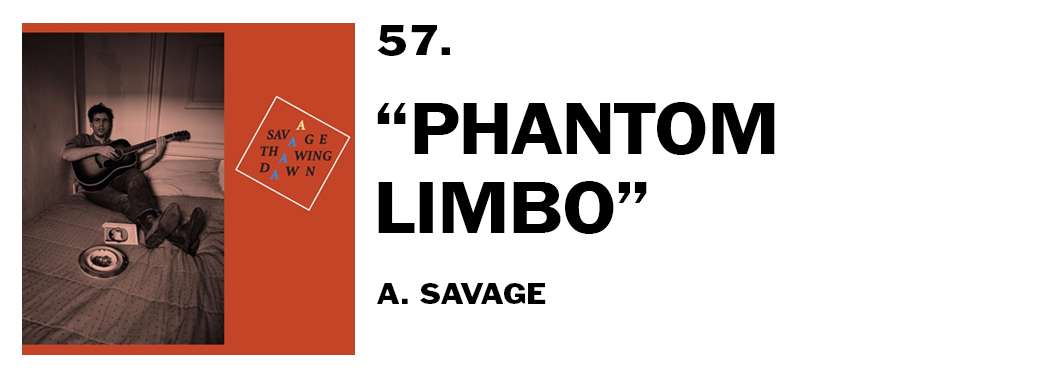
Andrew Savage of Parquet Courts surprised many with his strong solo debut album Thawing Dawn and one of the highlights was the pedal-steel led “Phantom Limbo.” Based around the idea of absence and how it can affect a person’s sense of reality, the song references to local taverns and tombstone dealerships and features Savage’s erudite observations and phrasing. It’s as dusty as it debonair. —Tim Scott | LISTEN

Summer is supposed to be a carefree time of vacations and sunshine, but this one was pretty brutal. Sure, there was a lot of music this year that attempted to capture the doom and gloom you feel when you’re trying to decide what you should be more worried about, the proliferation of climate change, loss of basic rights, or nuclear war. Lana Del Rey captured that sentiment, put it against a minor key, and pleaded, “hip-hop in the summer, don’t be a bummer, babe.” With a verse from A$AP Rocky and amazing ad-lib assistance from Playboi Carti, this song is what it feels like to try to live your life when the world around you is crumbling. Having a soundtrack for that makes the muck a little more palatable. —Leslie Horn | LISTEN
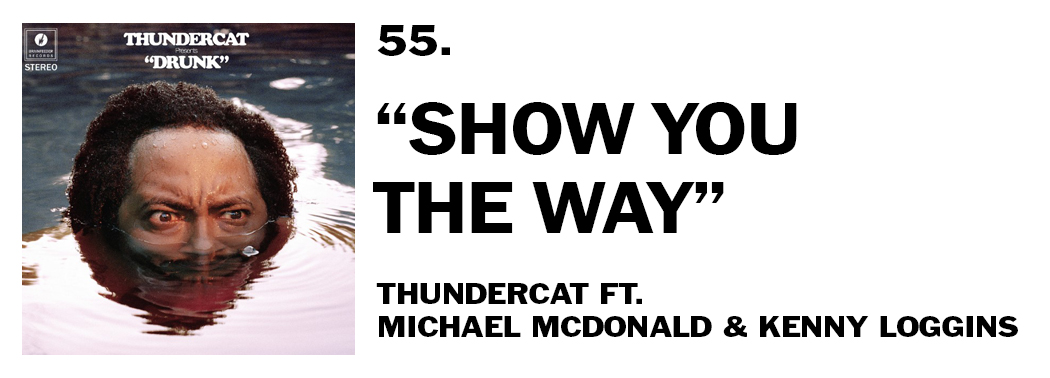
Look, we’re just going to say it: the yacht rock revival is real. In the most chaotic year in recent memory, there is nothing more calming than a smooth jam. Master of mischief Thundercat understands this—and the joyful irony of throwing Michael McDonald and Kenny Loggins on a song together in 2017—but what makes “Show You the Way” such a great track isn’t that it’s goofy, but rather a beautiful technical display of musicianship. Mac Daddy and Mr. 80s Soundtrack float perfectly alongside Thundercat’s dreamy falsetto, all while the jazz punk shows off his brilliant bass skills. It’s marvelous. —Eric Sundermann | LISTEN
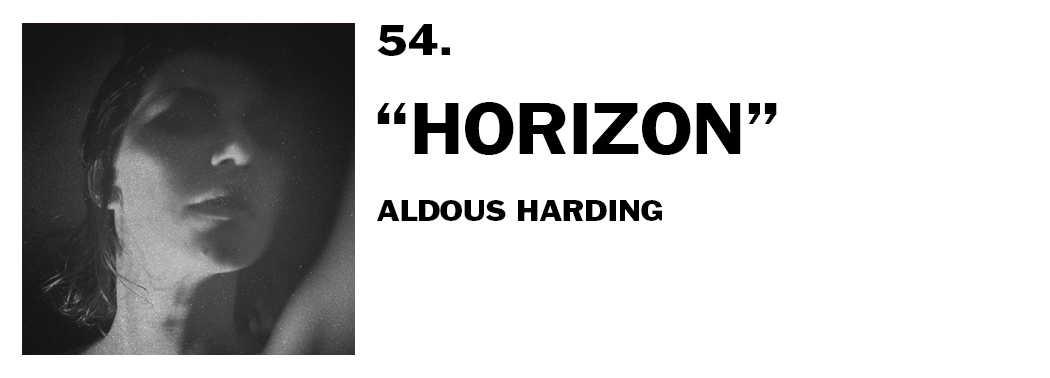
Anyone who witnessed Aldous Harding’s intense performance of “Horizon” on Later… with Jools Holland can attest to the song’s emotional impact. The New Zealand songwriter has explained that in some ways the song is about choosing art over a person, and lines such as, “Dancing to the edge of the world, babe, as I broke my neck” add a dark and emotional weight. —Tim Scott | LISTEN
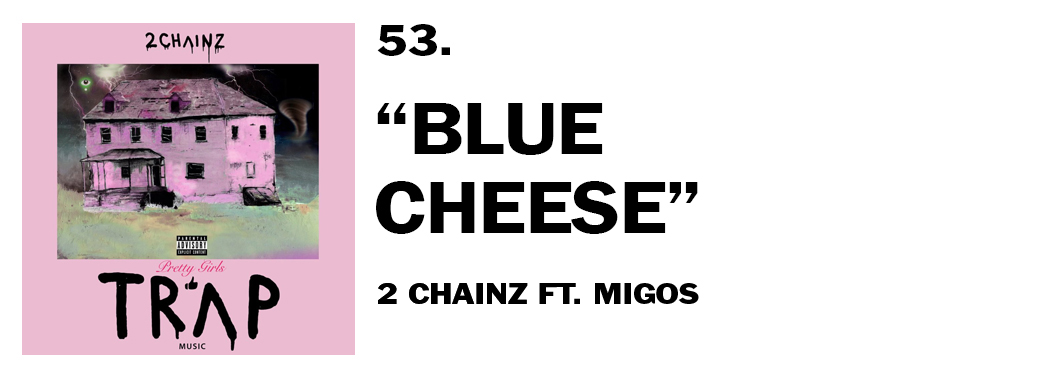
This song is on this list thanks to the line, “My side chick got pregnant by her main dude and I’m offended.” —Andrea Domanick | LISTEN
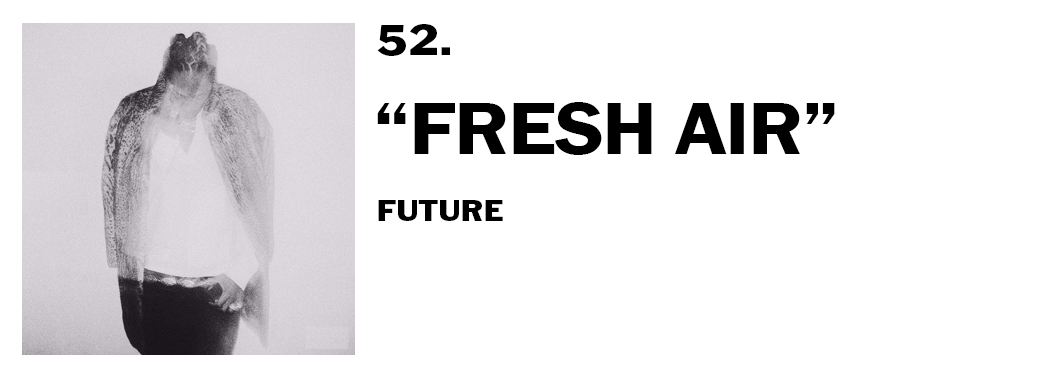
With HNDRXX cut “Fresh Air,” Future joins the ranks of Rihanna’s “Umbrella” and Guns N’ Roses’ “November Rain” with his own weather-inspired climate banger. Beginning with a sudden baile funk sample courtesy of Brazilian MC Pocahontas, Future paints a scene of nature in all its glory (“Sand touch your toes when you cookin’ breakfast / Pacific Ocean out the backyard lookin’ sexy) before bellowing “I’ma need fresh air.” The beat, a spacious sounding combo of jazzy trap and soulful backing vocals, allows the rapper to revel in the magic of oxygen, freeing himself from the chains of responsibility in this life of sin in favor of distance and good weather. —Jabbari Weekes | LISTEN

“I’ll have my cake and eat it too / I wish I could be good to you” is one of the most cutting lines on Charly Bliss’s debut album, Guppy. Full of desire, pain, and regret, it sees vocalist/guitarist Eva Grace Hendricks tending to wounds earned from heartbreak—sometimes soothing them, sometimes digging a finger in. It’s a painfully honest post-mortem about a relationship gone bad, and Hendricks spends as much time turning the scalpel on herself as much as her ex, providing a dark undercurrent to Charly Bliss’s sweet, hyper-feminine sound by adding a little ugliness. —Emma Garland | LISTEN
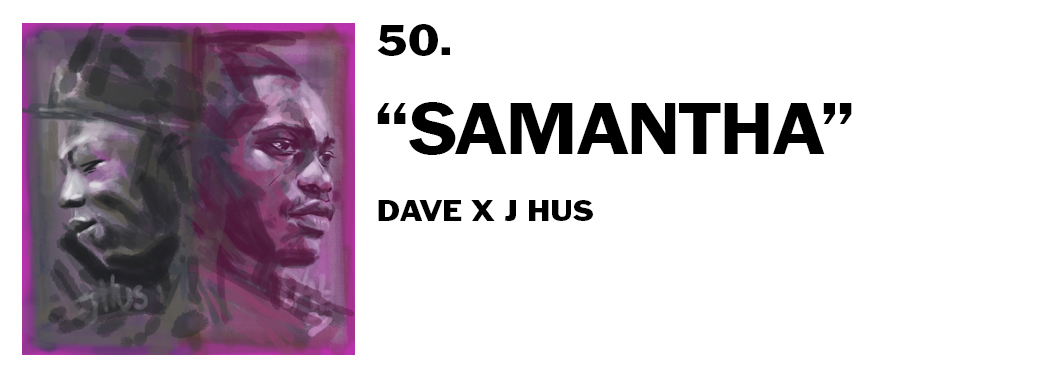
With Dave, J Hus, and a piano line with more gravitas than a baroque painting, “Samantha” is a coming-together of forces so great it deserves its own Marvel comic. The instrumental is rich, Dave’s vocal has the texture of chocolate melting in a pan, and J Hus delivers the single greatest line ever written about the off license. Shooting a portion of the video inside a church was fitting decision, because the whole thing makes the often rocky ascent to fame sound like a religious experience. —Emma Garland | LISTEN
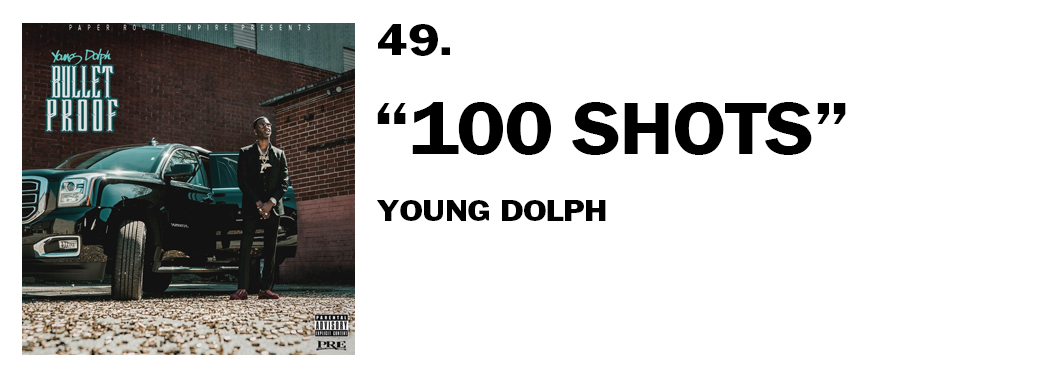
After being shot at, most people would try to stay off the radar for a bit. Not Young Dolph though. Not only did he get on stage right after that infamous incident in Charlotte—in which, yes, up to 100 shots were fired in a gun battle—he made a track cooly questioning his assailants’ competency. DJ Squeeky’s eerie synth parts and ominous drums provide a perfectly haunting canvas for Dolph to offer some of the steeliest shit-talking this year, and maybe ever: “How the fuck you miss a whole hundred shots?” —Trey Smith | LISTEN
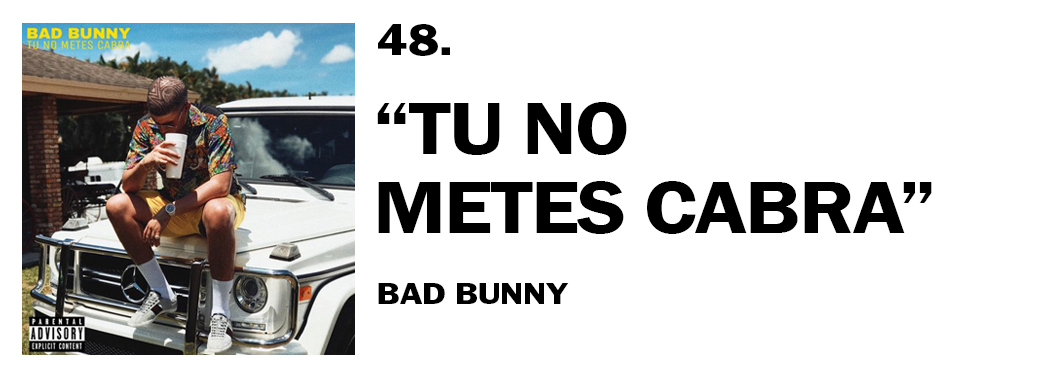
Few artists have deserved a victory lap over the past few years as much as Bad Bunny. On the strength of a his knack for melody (and few steely collaborations with some of the greatest working Spanish-language rappers and singers), his joyously ominous take on trap sounds has become wildly popular. That’s evident both through traditional metrics—the hundreds of millions of YouTube streams—and New York’s great smell test, whatever’s playing out of car stereos all summer. So, “Tu No Metes Cabra” is a much earned celebration. It’s a kiss-off to anyone who’s chosen to sit on the sidelines during his rapid rise, rapped smirkingly over a technicolor collection of 808s that’d make Metro Boomin proud. That it too quickly garnered over 200 million plays is only proof that he was right to gloat. —Colin Joyce | LISTEN

“The Louvre” is so good that it actually inspired a fan to attempt to hang Lorde’s sensational sophomore album Melodrama in the actual Louvre. And anyone who’s spent time in 2017 endlessly rewinding this strange wisp of a song knows that the extreme actions it’s inspired are more than deserved: Melodrama is an odd album—even for an art-focused pop star like Lorde, never mind anyone else—and “The Louvre” is one of its weirdest moments. Following the martial and comparatively straightforward “Homemade Dynamite,” “The Louvre” starts with a palm-muted guitar (who said those are dead?) and continually builds to a climax that never really happens. It’s delayed gratification at its finest—only, the gratification arrives via the endless delay, with dusky 4AD-ish guitars ushering the whole thing out of the room. You never know what you’re gonna get from Lorde, and “The Louvre” is just one of many examples of why that’s a very, very good thing. —Larry Fitzmaurice | LISTEN
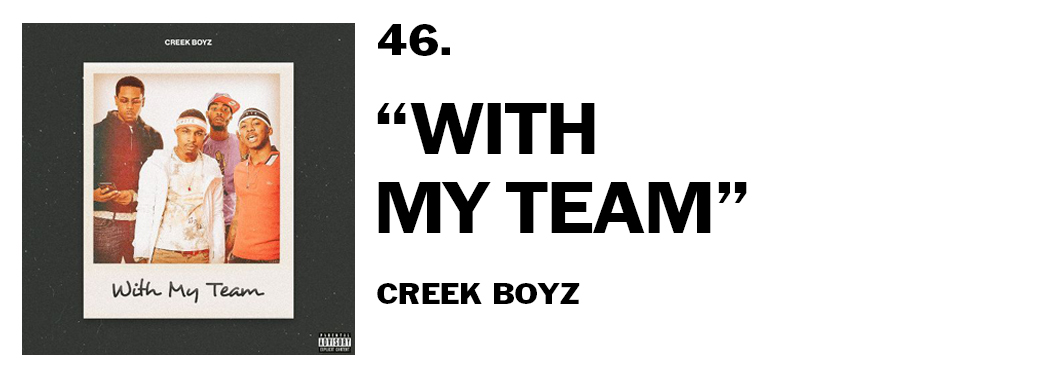
In the face of repeated trauma, leaning on a chosen family can be crucial to one’s well-being. Baltimore’s Creek Boyz have a clear grasp of that concept and it’s what makes the quartet’s chorus for “With My Team”—“Everyday we on our grind / Baltimore too many niggas dying / Gotta watch out for me and mine / Everyday I’m wit my team”—so significant. Baltimore is experiencing its deadliest year in two decades and because of that, being protected and nurtured by those closest to you is a means of survival. Even the unwieldy edit to its hook can’t take that away. —Lawrence Burney | LISTEN
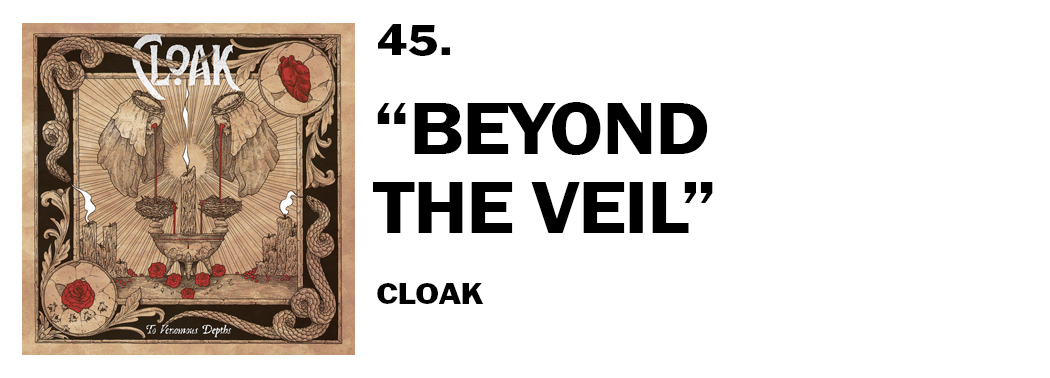
Atlanta’s Cloak is undeniably one of 2017’s underground breakout bands. Their Season of Mist debut, To Venomous Depths, is a Southern gothic answer to Tribulation’s glam death that marries sinewy black/death and gloomy, waterlogged doom with an almost supernatural command of melody. Album standout “Beyond the Veil” is just one example of their savvy black magic. —Kim Kelly | LISTEN

It’s so much harder to write a love song about uncertainty than security. South African producer Black Coffee and singer Bucie get credit for doing just that on “Superman,” their yearning 2010 cut that Drake reworked into the heartrending “Get It Together.” Its pulsing update is an intoxicating standout in the lush forest of More Life, Jorja Smith’s sigh of “give me a kiss goodnight” clinging to you as soft touches of piano accent her pleas. 20-year-old Smith is the real star here, singing with a sense of gravity and tenderness that you didn’t know you were missing until her delicate “Hello…” —Jill Krajewski | LISTEN

Devil Master’s 2017 EP, Inhabit the Corpse, came out snapping at the heels of their jaw-dropping 2016 demo, and its title track sums up the Philadelphia newcomers’ raison d’être: spooky, over-the-top metal-punk with filthy leather boots planted firmly in both 90s black metal and crust punk, an utterly unholy blend of Mortuary Drape, Judas Priest, and Anti Cimex. This jawn fucking rules, and with any luck, Devil Master will be haunting a town near you soon. —Kim Kelly | LISTEN
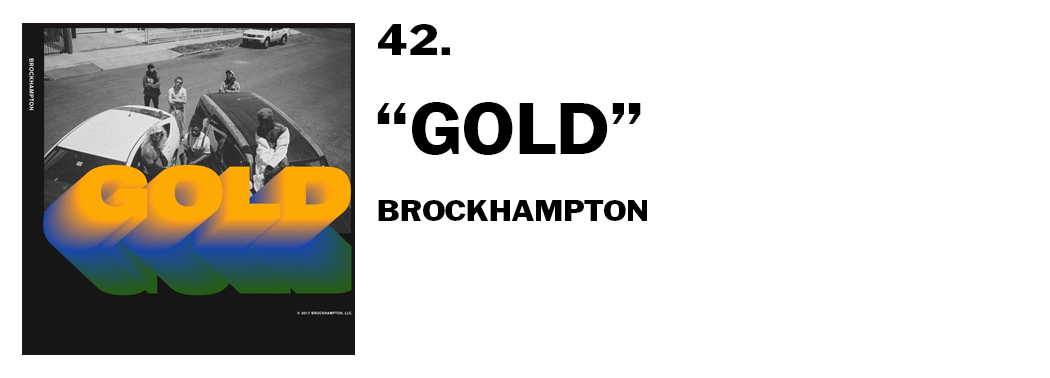
When we look back on 2017 in a decade’s time, a few musical gems will stand out. Brockhampton, the only boy band that formed on the KanyeToThe forums, should certainly be one of them. “GOLD” is one of the finest moments from the three albums they’ll have released by the time this year’s up (Saturation III, their final record, comes on December 15). With an infectious hook and unique verses from members with developed and clear individual voices, the Saturation cut is everything your favorite boy band should be. —Lauren O’Neill | LISTEN
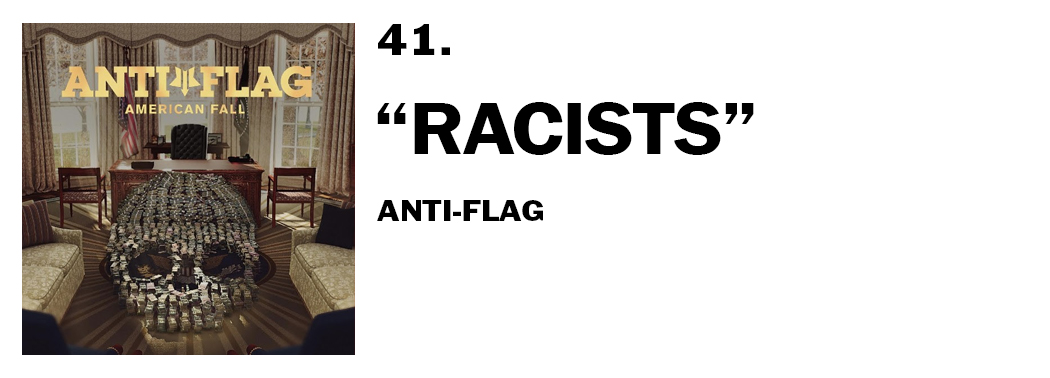
The long-running Pittsburgh punks Anti-Flag have inspired multiple generations of young punks (and metalheads) to wake the fuck up and get political. Even if the unabashedly left-wing, anti-capitalist quartet’s sound has mellowed a tad since the 90s, their message hasn’t; if anything, it’s only gotten sharper since the Bush era spawned some of their finest and most furious work. “Racists,” a lead single off their new album, American Fall, was directly inspired by the tragedy at Charlottesville, in which a white supremacist rammed a car into a crowd of peaceful protestors and murdered Heather Heyer. The catchy, poppy tune eviscerates a litany of racist tropes and Trump-era right wing talking points, its singsong chorus daring you to disagree: “Just ‘cause you don’t know you’re racist, you don’t get a pass for your ignorance!” —Kim Kelly | LISTEN
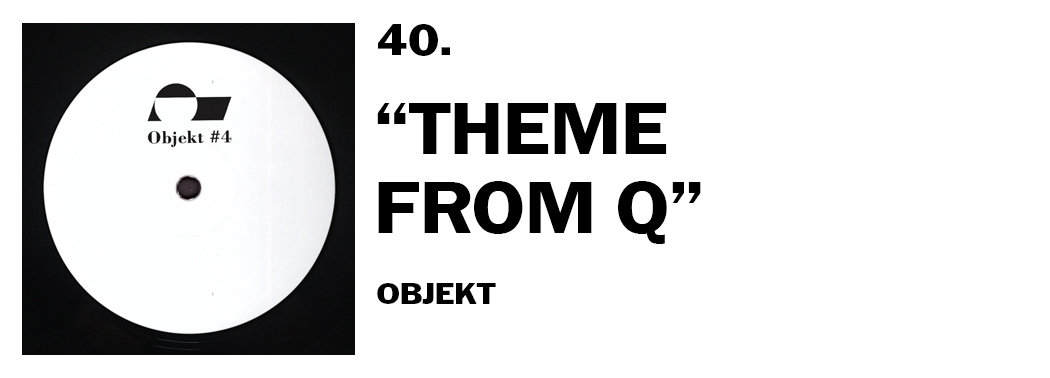
As a playful outlier in techno’s more experimental corners, Objekt’s always been unafraid to let his hair down. But even by his standards, “Theme From Q”—from Objekt #4—is a track of surprising glee. Built around a two-stepping drum loop, a chattery vocal sample, and a lead synth line that recalls slamming a fist on a keyboard, it’s an anthem for those who remember that ecstasy’s the whole point of this dance music thing. —Colin Joyce | LISTEN

Ric Flair once described himself as a “stylin’, profilin’, limousine-riding, jet-flying, kiss-stealing, wheelin’ n’ dealin’ son of a gun!” And on this sparse floor-shaker from the Metro Boomin-produced Without Warning, Offset channels the Nature Boy and joyously counts the personality traits they share, which is basically all of them. For a bit of a test, try to guess if this colorful flex belongs to Flair or Offset:
“Going to the jeweler, bust the AP, yeah
Slidin’ on the water like a jet-ski, yeah
I’m tryna fuck you and your bestie, yeah
Chopper with the scope so do not test me, yeah”
Could’ve been either. —Trey Smith | LISTEN

The opening track on The Smith Street Band’s More Scared of You Than You Are of Me kicks off with the line: “Tell Jesus he’s a fucking loser.” That alone is enough to earn the song a spot on this list, but from there it goes on to showcase the Aussie’s punks’ loud, obnoxious style, which gradually spirals out of control until frontman Wil Wagner sounds downright maniacal about the chaos he’s created. —Dan Ozzi | LISTEN

Moses Sumney howls in a falsetto so beautiful that even when you can’t make out half of what he’s saying, you’re probably still sobbing. Luckily, with this song—a slightly different version from the one that appeared on his 2016 Lamentations EP—you can’t miss the refrain. He sings the word “lonely” at least 60 times. And as has been Sumney’s way since his brand of contemplative soul first hit in 2013, this song curls around your body like smoke, thick with emotion. Oh, and he’s saying “fog in the morning, going nowhere.” —Tshepo Mokoena | LISTEN
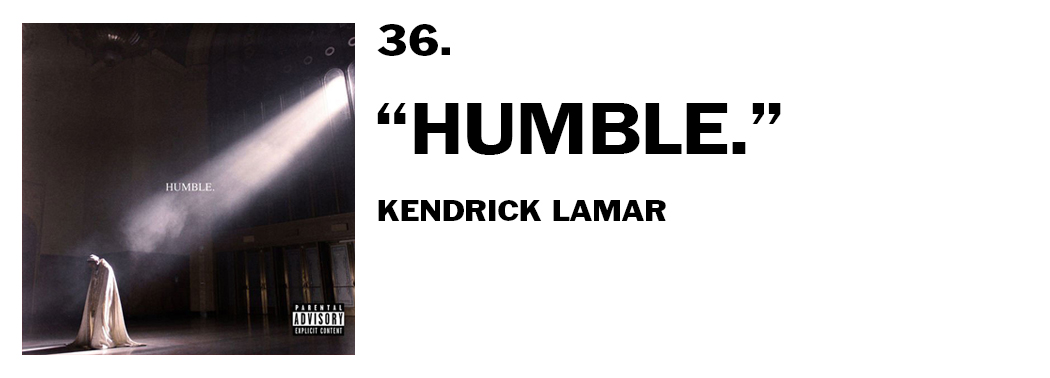
Kendrick Lamar announced DAMN. boldly, spitting, “I am the greatest rapper alive.” But “HUMBLE.” has little to do with anyone but Kendrick himself, staring in a broken mirror, asking his audience to judge the reflection. He talks himself up then sits himself back down. His flow is forced into fragments: ”syrup sandwiches,” “stretch marks,” “watch my soul speak.” Mike WiLL Made-It’s urgent beat, originally meant for Gucci Mane, sounds like it could’ve pulled Kendrick into the club. But in context on DAMN., it just pulls him deeper into himself. —Alex Robert Ross | LISTEN
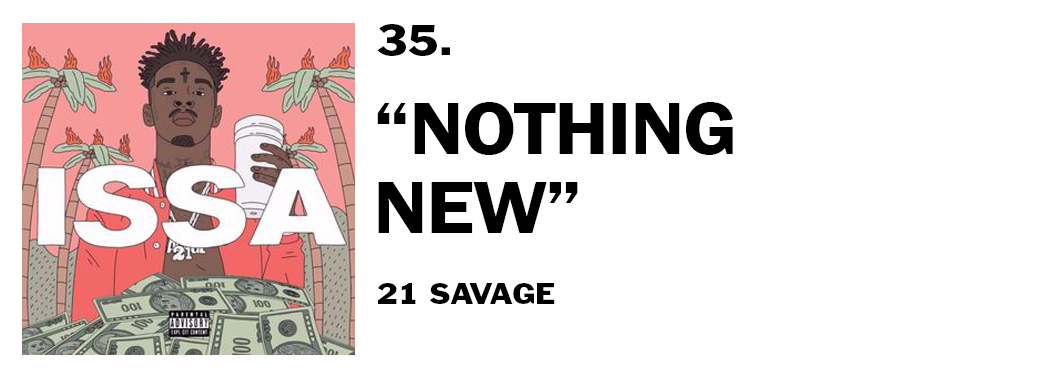
21 Savage knew he was going to turn heads with Issa Album’s hood anthropological study, “Nothin New” when he opened, “they thought I only rapped about murder and pistols.” The semi-autobiographical song details the maturation of a young black boy without a father or a functional mother, who eventually gets swallowed up by the elements: slinging drugs, cutting school, and toting firearms. But instead of leaving it in the present, he paints a comprehensive picture of the repercussions of whitelash and the prison-industrial system to make sense of how we got here. This is hardly surprising; 21 Savage has revealed these analytical qualities in numerous interviews, but it’s nice to get them on wax. —Lawrence Burney | LISTEN

How do you make a hit in 2017? Well, you win the hearts and minds of Twitter. With its list of foolproof steps for ridding oneself of a low-down, no good dirty dog of a man who only texts when he’s drunk, “New Rules” did exactly that, and earned British singer Dua Lipa a UK number one in the process. And while it just falls short of timelessness (a clubby instrumental in place of a good old fashioned chorus is the Pop Curse of 2017), you have to admit it’s an absolute blast. —Lauren O’Neill | LISTEN
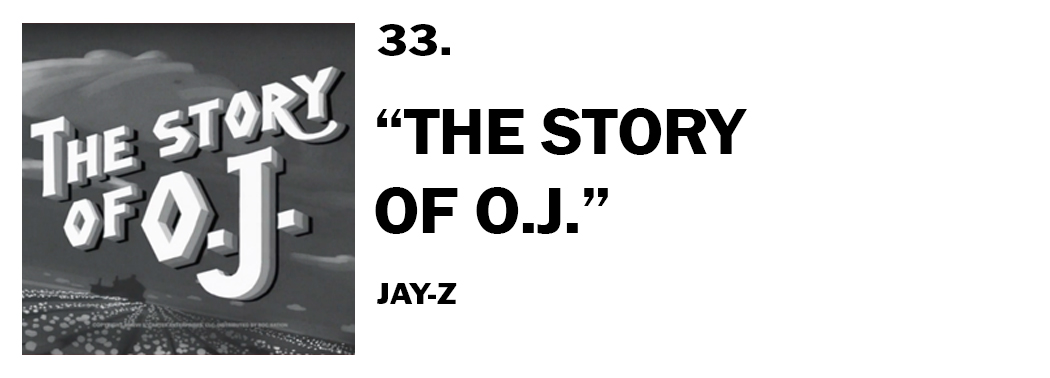
You know how in every single Fast and Furious movie—or at least, like, six of ‘em—there’s a character who disappears? You know, when you can’t figure out where they’ve gone and assume them to be dead because maybe they didn’t provide enough bazooks for a bazooka, or maybe they got killed off by one of Jason Statham’s goons, never to be seen again, only to be remembered through Corona toasts at the next barbecue at Vin Diesel’s house? Then, before you can say “family matters,” they’re suddenly back in the final act of the film, saving the day by driving a sports car in reverse through a skyscraper, proving to the world that they were the most badass the entire time and that you’re a chump for ever doubting? That’s pretty much what JAY-Z did with this song, and all of 4:44. —Eric Sundermann | LISTEN
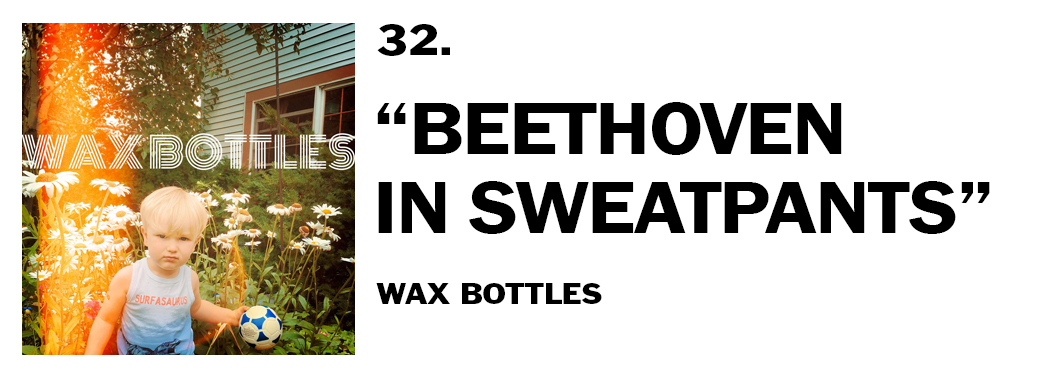
Wax Bottles snuck a debut EP under most people’s noses this year, but those who discovered the New Jersey band were immediately hit by waves of late 90s post-hardcore flashbacks. There’s a healthy helping of Static Prevails-era Jimmy Eat World, a bit of Rainer Maria, and maybe even some Sunny Day Real Estate. The band boasts members of the Gaslight Anthem and Polar Bear Club, yet sounds nothing like either. The six-song release lays the groundwork for what they’re about, but really, their entire essence is captured in the first minute of the opening track, right when its clean guitar intro gets swallowed up by a joyous wall of distortion. —Dan Ozzi | LISTEN

When David Byrne of Talking Heads was approached about Selena Gomez’s “Bad Liar,” which borrows the iconic bass riff from the band’s 1977 single “Psycho Killer,” his rep said he “wholeheartedly gave his approval.” And, upon hearing it, why wouldn’t he? “Bad Liar” is a dazzlingly clever reinvention, built almost entirely around the sample and a bristling, erotic whisper of a vocal. Minimalist in approach, but with a huge payoff, “Bad Liar” is a great example of how Gomez is becoming one of the most fascinating artists in pop. —Lauren O’Neill | LISTEN
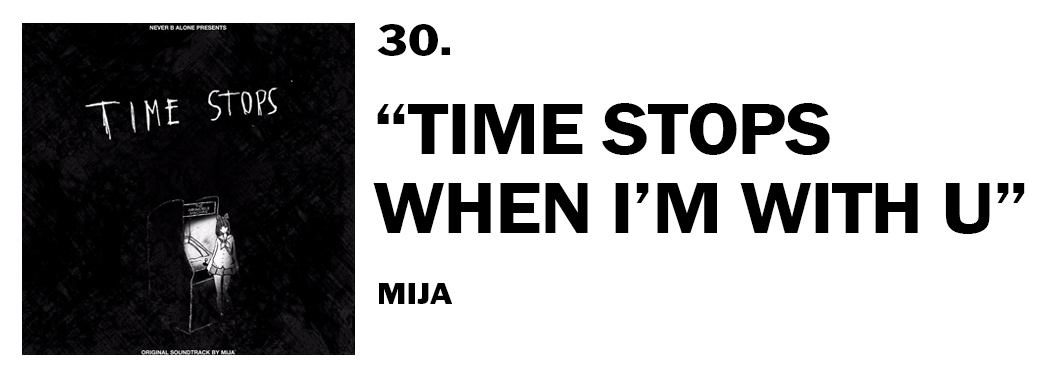
Part of the joy of Los Angeles producer Mija’s genre-agnostic approach to dance music has been that she’s unafraid to explore the parts of the style that history hasn’t traditionally looked too kindly on. Like all of her best tracks, “time stops when i’m with u” is a revisionist history of the realm’s goofier corners, drawing on the unselfconscious joy of dubstep, vocal trance, anime themes, and basically any of the stuff you might have come across if you were an avid player of DDR. Its cheery chorus reanimates happy hardcore’s sugariest moments to make this one of the sweetest love songs ever to emerge from the high-gloss world of what you might call EDM. —Colin Joyce | LISTEN

Sorry, but could you design a song that sounds more like a vest and shorts? No, you could not. This is the most putting-SPF-10-on-your-legs song that has ever existed. “Despacito” featuring Justin Bieber—who heard the original track while clubbing on tour in Colombia and wanted in on the hype—is summer in a bottle. It sounds precisely like all-inclusive vacations and unfamiliar brands of chips and trying to brush the salt out of your hair and going “ahh” immediately after sipping a beer without shoes on. It is perfect. —Emma Garland | LISTEN
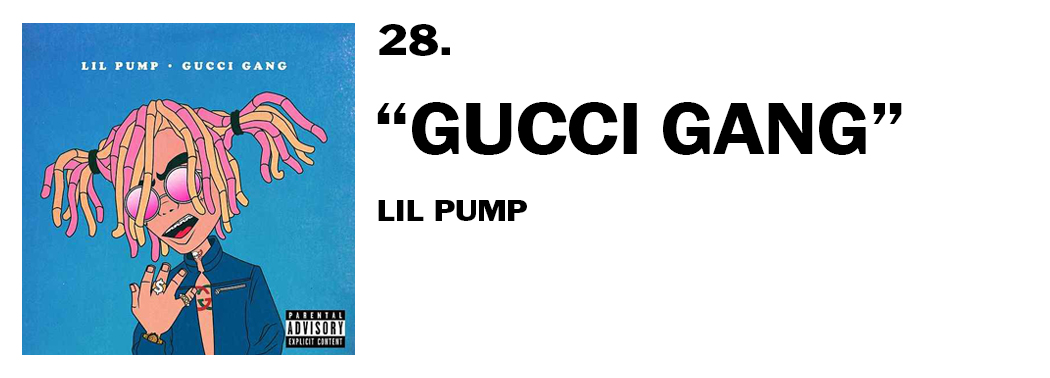
Replace all the words with the title, make it go faster, swap it out with other Lil Pump songs at random: no matter how corrupted it becomes, “Gucci Gang” endures, so simple it’s fundamentally unbreakable. It’s not a great song in the classic sense, but it’s the “Smells Like Teen Spirit” of Soundcloud rap: a rallying cry for a generation raised on Vine and YouTube poops. Thanks to the success of “Gucci Gang,” the floodgates are now open for Pump, Purpp, and a gaggle of teenage “Lil”s to conquer the mainstream with brickwalled beats and subconsciousness-infiltrating hooks. Everyone, sing along… —Phil Witmer | LISTEN

Are you saying this song came out this year, yeah? It’s so ubiquitous in the UK it feels as though it’s been played through every wedding, birthday party, frat party, and whatever-the-fuck-else since time began. And that’s no bad thing: it means Hus has created something timeless with “Did You See.” Plus, you can always measure the longevity and brilliance of a pop song by knowing whether your grandma would also buss a move to it, which she undoubtedly would. —Ryan Bassil | LISTEN
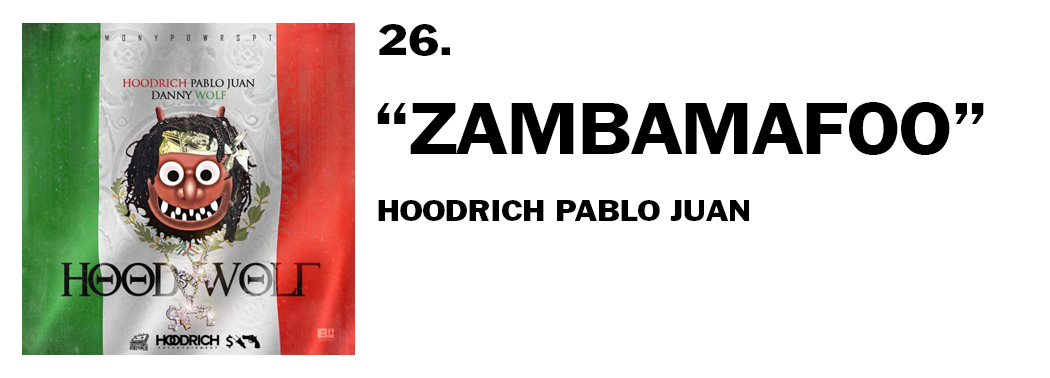
Over the course of the past year, Ronny J’s become the go-to producer for the sort of scummy, speaker-shattering trap mutation that’s stormed the charts, but this beat with Danny Wolf and DJ Spinz is almost certainly the most infectious he’s been involved with. Each note of the distortion-scoured bassline hits with enough force to Kool Aid Man through the eardrums of unsuspecting listeners, allowing room for Hoodrich Pablo Juan to slink in and—intentionally or otherwise—imply that he’s rich enough to wear clothes made out of a beloved 90s public TV lemur. It’s simultaneously goofy, upsetting, and room-shaking, which is exactly the mix of feelings that makes his work so endearing. —Colin Joyce | LISTEN
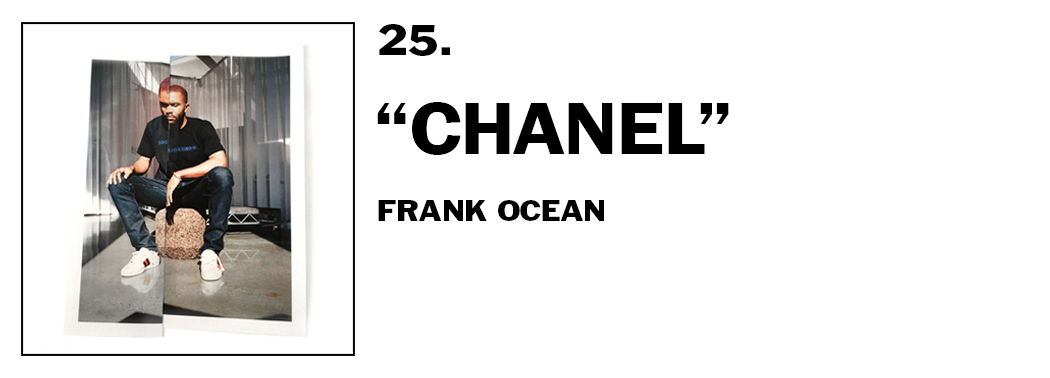
Frank Ocean’s “Chanel” grabs you from the first line. “My guy pretty like a girl / And he got fight stories to tell,” he sings sweetly and boastfully. Frank released a handful of singles this year via Blonded Radio, but “Chanel,” sung over slow, lulling piano chords, was the most arresting. It’s a song that’s feels both personal and vague at the same time, setting several amazing little scenes, line by line, like “hide my tattoos in Shibuya, police think I’m of the underworld” or “film it with the drone cam, in the pink like Killa Cam.” During the refrain, he belts out that he “sees both sides like Chanel,” overwhelming the sparse instrumentation, sucking you in to hear just what those stories are. —Leslie Horn | LISTEN

“THIS COUNTRY MAKES IT HARD TO FUCK!” In the immortal words of Logic’s “1-800-273-8255”: Who can relate? The Knife member Karen Dreijer’s snarling, sumptuous second album as Fever Ray, Plunge, is as political as it is purely sensual, and “This Country” is perhaps the album’s most striking collision of those two thematic poles. Synths squiggle like power lines cut loose in the wind, drum machines hiss like steam, and Dreijer calls for free abortions, clean water, and the destruction of nuclear proliferation before stating nonchalantly, “Every time we fuck, we win.” Angry, passionate, direct, and noisy as shit: “This Country” is political music that feels utterly essential, in this or any other year. —Larry Fitzmaurice | LISTEN

Charli XCX’s sonic trajectory up to this point has resembled an EKG printout of someone having a massive heart attack. Zig-zagging between crunchy pop-rock, smooth and darkly shaded electro, low-slung hip-hop beats, and (most recently) PC Music’s glitched-out meta-mayhem, the UK pop troublemaker’s brand has undoubtedly been chaos. So consider “Boys” the cool glass of water after a cavity-baiting candy binge. Featuring uncharacteristically restrained production, “Boys” is all empty space and winsome video game noises, with Charli delivering her vocals with a nonchalance that perfectly fits the song’s slack, low-stakes maxim. Of course, “Boys” was accompanied by an instantly iconic video, one of the year’s best—but even if the video sucked, the song would still be great. —Larry Fitzmaurice | LISTEN
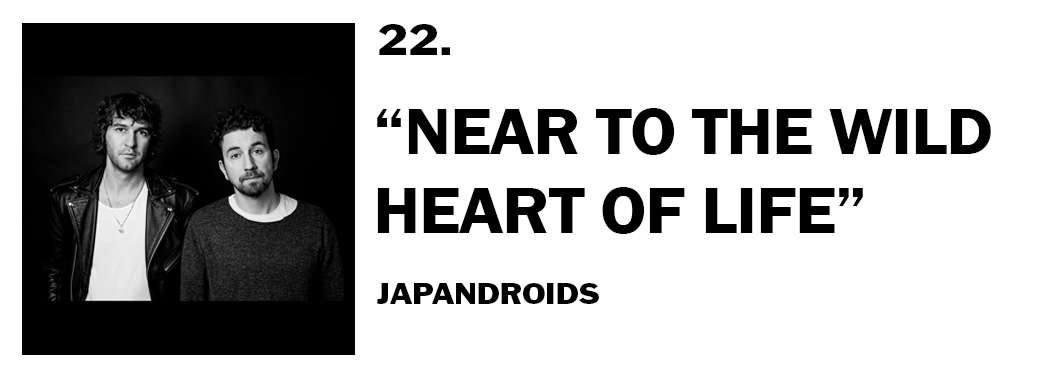
Japandroids made it very, very clear that with Near to the Wild Heart of Life that they weren’t interested in repeating the party rock formula that earned them a huge following on 2012’s Celebration Rock. And while the Canadian duo scrapped much of the fuck-it-all, late-night epiphanies that made their past catalog such a beloved and joyous one, they threw the Japandroids-faithful some red meat with this opening title track, replete with a fist-in-the-air, shout-along chorus that threatens to “make some ears ring from the sound of my singing, baby.” —Dan Ozzi | LISTEN
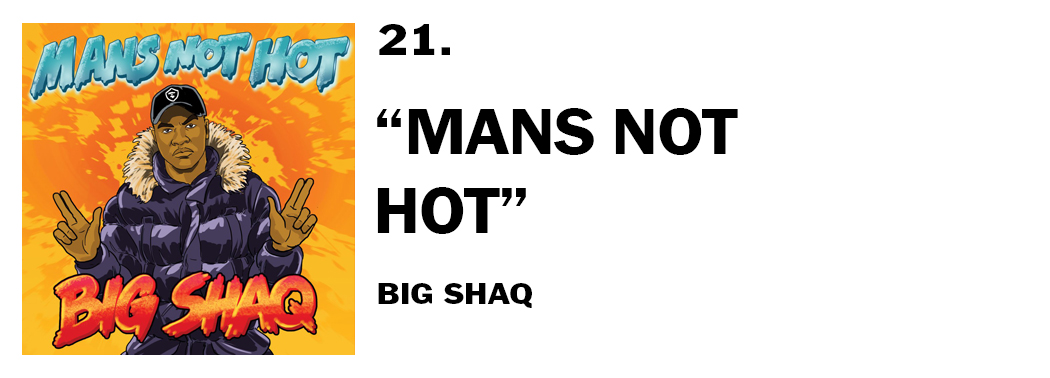
Ah yes, 2017: the year a London comedian delivered a freestyle about coats and produced a meme so internationally embraced it ended up being released on Island Records. A PG road-rap anthem beloved by all ages, “Man’s Not Hot” inserted itself everywhere from club nights to weddings to a Jeremy Corbyn speech and, regrettably, a House of Commons debate about the autumn budget. There’s something to be said about its absurdist nature capturing the twin elements of escapism and interconnectivity that define the current zeitgeist, but mostly it’s good because he says “boom” a lot over a really hard 67 instrumental. —Emma Garland | LISTEN

Taken off the Michigan trio’s split with UK sludge fiends Moloch, “Biting the Air” showcases Cloud Rat’s long-held commitment to frantic, feral grindcore, while also leaving just enough breathing room for their more outré melodic tendencies to peek through. The band’s flurry of releases in 2017 showed them swirling their toes into all manner of new sounds—from goth, to riot grrl, to noise—but songs like this one show why they remain one of grind’s most precious assets. —Kim Kelly | LISTEN
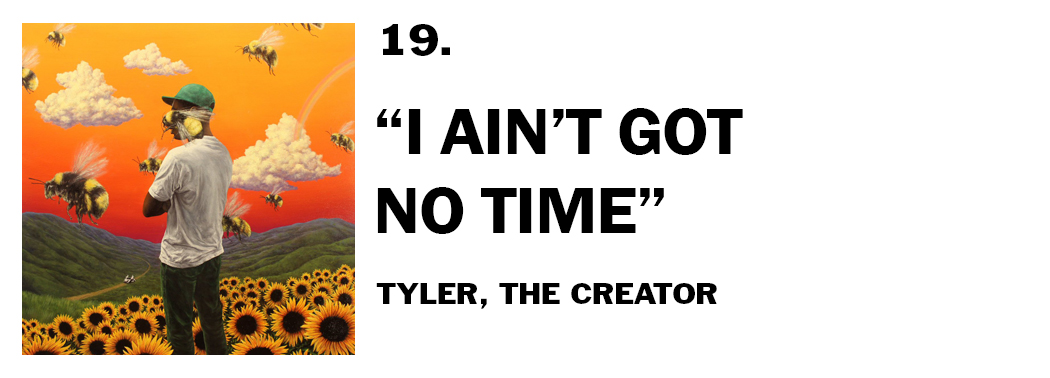
Fun fact: Tyler originally offered this song to Nicki Minaj, but she turned it down. Apparently, she couldn’t think of anything. “How the fuck you hear this beat and can’t think of shit?” he told Zane Lowe. We couldn’t agree more. —Andrea Domanick | LISTEN

Nothing ever prepares you for the way grief hits you in the chest then pulls up a chair and settles there. On this bare-bones single, Sampha turns that sensation into song. He pours the memories of his late mother (who died of cancer in 2015) over piano, echoey percussion, and a few layered vocals in a way that you can only imagine helped him cope with her death. It’s no accident that this Mercury Prize-winning album is called Process. Sampha makes sense of the pain, the growth, and the indescribable loss by turning it into unforgettable art. —Tshepo Mokoena | LISTEN
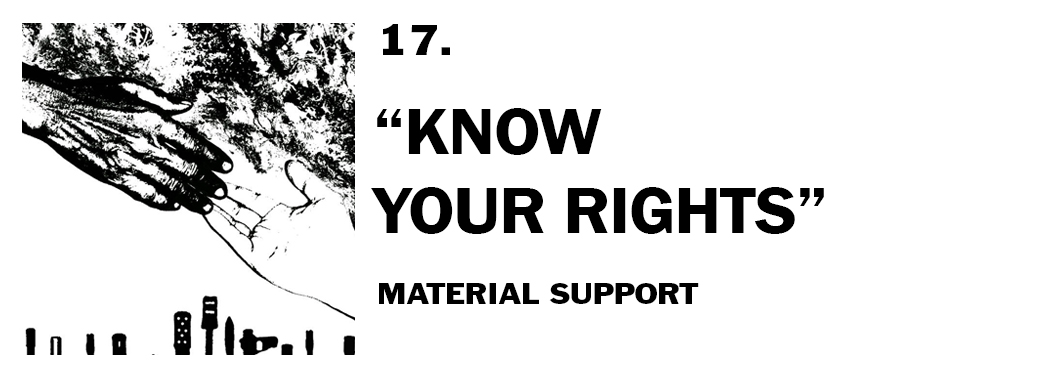
NYC Pinoy punks Material Support are dedicated to the fight against state repression, government corruption, and patriarchy, views they articulate amidst a storm of breakneck guitars, shattered d-beats, and vocalist Jackie’s own fierce howls. They excoriate bougie white girls, Bernie bros, transmisogynists, fascists, and the State with gusto, while making time to extend solidarity to their comrades in the struggle. The comparatively quiet “Know Your Rights” is a bit of an anomaly in their catalog, but is perhaps their most impactful track to date. In 2017—when ICE stalks the streets, when killer cops go free, when fascism creeps—what could be more important than a distorted agitpunk song that’s actually a “know your rights” training, led by a fire-breathing Filipina revolutionary? —Kim Kelly | LISTEN
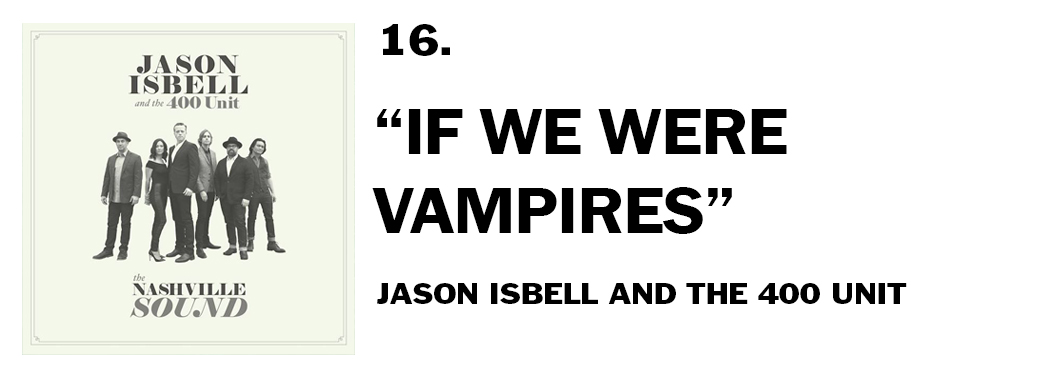
In the Buddhist practice, there are three basic facts of existence: impermanence, suffering, and insubstantiality. It’s said that through understanding these three facts, you will come to understand existence itself and, if you’re lucky, become liberated by that realization. “If We Were Vampires” deals expressly with the impermanence of life (“Maybe time running out is a gift”), but treats it like the call to action that it is meant to be. As Isbell puts it, “I’ll work hard ‘til the end of my shift.” — Annalise Domenighini | LISTEN
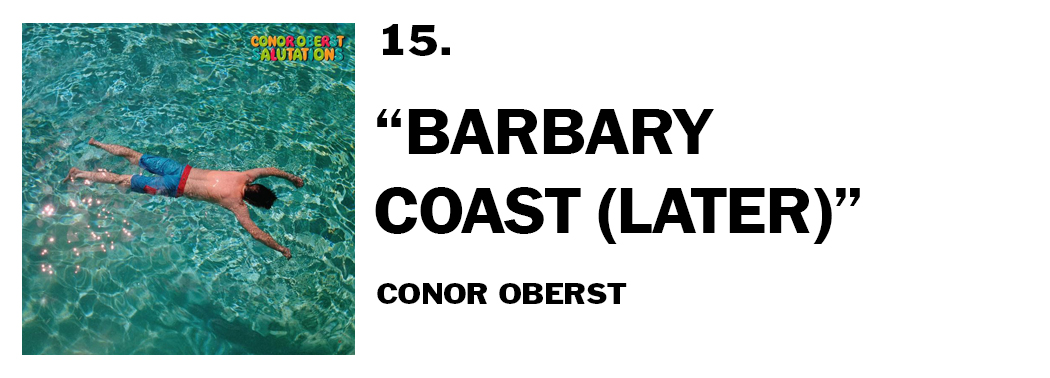
Conor Oberst has long held a reputation as King Sad Boy, stemming from his emotionally vulnerable beginnings with Bright Eyes as a teenager. But the label has seemed less fitting as he’s matured into a multi-faceted artist. The heartache Oberst suffered over the last few years, though, was heavy enough to pull him back into a dark place. While drinking away months of personal and legal issues stemming from false rape allegations, he holed up back home in Omaha to write songs that became a sketchpad of a release in 2016, Ruminations, and a fully realized album as Salutations in 2017, one of the best and most personal records of his long career. And while Oberst’s unsteady voice has always made him sound a bit melancolic, on “Barbary Coast (Later),” he is at his most fragile, sounding hopelessly alone as he sings, “‘Cause once all the friends I had / Have used me up and left / I bet you’ll hang around awhile.” —Dan Ozzi | LISTEN
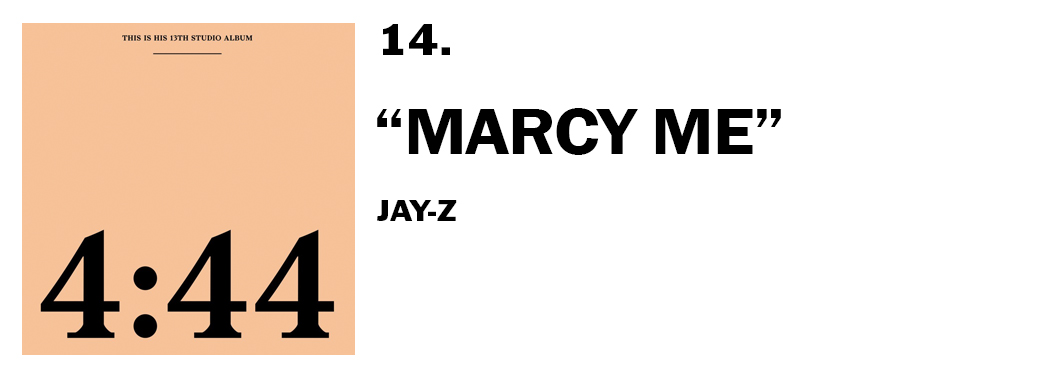
Most of the value placed on JAY-Z’s 4:44 has come from his willingness to shed his hard exterior and open up about secrets that he’d been keeping from himself, not to mention his audience. But let’s not trick ourselves; the reason we give half a damn about what JAY-Z has to say is his supreme gift for words. His best showing of that on this album is “Marcy Me,” a look back on the Brooklyn of the 70s and 80s that shaped him (“not this new shit”). A Broadway-esque hook from The-Dream adds to the nostalgia and lines like “Marcy Me / Streets is my artery, the vein of my existence / I’m the Gotham City heartbeat / I started in lobbies, now parley with Saudis / I’m a Sufi to goofies, I could probably speak Farsi,” give it the eternal replay value. —Lawrence Burney | LISTEN
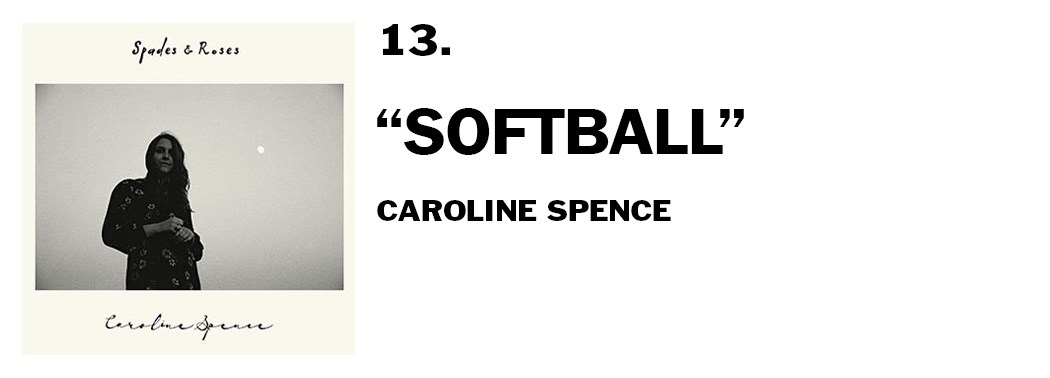
Have you ever worked hard to accomplish something, maybe even harder than your competition, only to find out the goalposts had moved as soon as you got to them? Or maybe in this case, the bases are loaded, you hit a homerun, but it’s immediately made void because your hair was braided and not in a bun? That’s the kind of bullshit that inspired Caroline Spence’s “Softball.” —Annalise Domenighini | LISTEN

St. Vincent is factual about drug consumption on the playful sounding “Pills” from Masseduction. The song doesn’t say drugs are bad (she took sleeping pills), but they were just something needed at one point and that’s it. Metabolizing this period in her life and putting it to song, St. Vincent made a hyperactive drum machine and synth-bass pop dream. Layered beneath the upbeat sounds are darker lyrics (“anyway there’s a day / and I’ll pay it in pain”) but there may be little use in moralizing its content. The song also features Cara Delevingne, Jenny Lewis, and a Kamasi Washington’s sax comedown. It’s danceable, raucous, and a little bleak, but isn’t that just life anyway? —Sarah MacDonald | LISTEN

Anything that borrows from Shawty Lo is more than worthwhile and praiseworthy. “T-Shirt” is a legend-making song, showing what Migos are capable of both as individuals and an entity. It’s hard to discuss the song without bringing up its Revenant-inspired music video, which made “T-Shirt” feel like a cinematic event in itself. The open-ended Nard & B beat leaves the group room to fill the song with the layers of ad libs and spectacular solo verses, but in a refined manner that we’d only seen glimpses of previously (think “Birds” or “Finesser”). “Bad and Boujee” is where the Migos were finally acknowledged as superstars, but with “T-Shirt,” the trio ensured their artistry can’t be denied either. —Trey Smith | LISTEN

The sewer under the streets of London is tightly packed with fatbergs and liquid excrement, horrible brown and greasy stuff squeezing its way through rotting condoms and past umteen rats. It’s a disgustingly interesting place to be and most cities have a similarly debilitated piping system running underneath everything. What they don’t have however is King Krule, an artist with a unique singular vision. Whether in his solo or band work, Archy Marshall has often operated above the ground, somewhere near the moon, or he’s been buried beneath the earth, somewhere close to the seabed. Yet with “Dum Surfer,” a standout track from his latest album The OOZ, he emerges from some other underworldly place—a location that could be the sewer but might be the horrible pub where he’s spent the past few days marinating in a pile of sick and booze. While it may not be the most emotionally dark song he’s released, it is the most tangibly filthy—a slow, stinking groove of a tune, reeking of jazz cafe toilets and nicotine stained fingertips. This is where guitar music is headed next: fascinatingly deluded and lead by a man who can turn a line about “skunk and onion gravy” into a portrait of madness. —Ryan Bassil | LISTEN

The best artists are the ones who open their full selves to us, even when it’s painful, and these days Kendrick Lamar leads on that front. We know how he plotted to get one of his first high school flings. We know that he saw someone get killed right in front of his eyes before he was barely old enough to go to school. We know that he stayed away from weed because he mistakenly smoked a blunt laced with PCP as a teenager. And now with DAMN.’s “FEAR,” we know everything that’s frightened him since his childhood.
The song breezes through young Kenny who, as a child feared his mother’s spankings, and, as a teen, feared losing his life for being wrongfully identified as a gangbanger. 27-year-old Kendrick’s fears were a bit more familiar, though. The experiences that he details from his youth make it hard for him to accept that he’s escaped those traumas, at least, in the physical sense. And as a result, he questions if he even deserves what he has: “All this money, is God playin’ a joke on me?” When he wrote “FEAR,” Kendrick felt as if the world was on his shoulders and if he didn’t use his platform and riches for the greater good, then maybe they could be taken away with the quickness. K.Dot isn’t alone in having these kinds of internal dilemmas, but for so many rap stars of his level, we never get the privilege of knowing. We only hear about their highs. —Lawrence Burney | LISTEN

“Biking” is pretty and ecstatic, overwhelmed, simple, and complex. It debuted at the very end of Frank Ocean’s Blonded Radio 003, right after “Futura Free” crackled out, and all the gratitude that Frank got through at the end of his Blond(e) closer is put into perspective when JAY-Z wanders in here: “Life goes in cycles, what comes around goes around / So before it goes down / Nigga, get you some icicles.” As much as he’d like to follow JAY-Z’s advice, Ocean sees every moment of joy and every bauble of fame on “Biking” as a springboard into cosmic introspection.
In some ways, the real precursor to “Biking” turns up earlier in Blond(e). “Solo” is another beautifully melodic mini-crisis, and the parallels between the acid tabs he drops at there could easily be the same ones he’s tripping on while he rolls around on his bike, half in heaven, half in “Hades,” enjoying the sound his wheels make while careening about his own mind. Either way, we get the pure, almost incomprehensible exhilaration of “Biking”’s closing bars, when Frank yelps at the top of his lungs and the song spins away beneath him. That in itself is enough of a gift from a man whose music has made the last two years bearable. —Alex Robert Ross | LISTEN

“LMK” was the perfect choice for Kelela’s debut album Take Me Apart’s lead track because it encapsulates everything she, a student of many different genres, does so well. In blending different forms—here, a lethargic, house-y throb beneath a meticulously crafted R&B melody—she paints a lush aural watercolor that feels therapeutic, electric, and entirely hers. It’s against this vivid backdrop that “LMK,” a tale of two people locking eyes across a crowded club, hazily unfolds. In different hands, that’s a narrative you’ve heard before, but Kelela, of course, spins it into her own very special brand of magic, completely unique on 2017’s musical landscape: no song has been as simultaneously catchy, smart, and stylish in a long while. —Lauren O’Neill | LISTEN

“Mask Off,” which comes from Future’s eponymous album, one of Nayvadius’s best projects, is a perfect display of why the Atlanta star continues to stand at the forefront of rap. Metro Boomin’s production—featuring the best use of a flute sample in the history of rap (who would’ve thought that was a sentence that’d be typed this year?)—is brilliant and menacing as always, but there’s something so progressive about the way Future’s growl effortlessly floats over the beat. Lyrically, the rapper touches on the subjects we’ve come to expect from him—drug use, depression, using drugs to fight depression—but the power with which he repeats the words “Percocets, Molly, Percocets” makes the refrain feel more like a chant, quietly reckoning with demons by chasing the night while hating yourself for chasing the night once again. Future has always been the champion of creating anthems about turning up through your pain, but the introspective nature of “Mask Off” makes it one of the finest and most expressive moments of his extremely prolific career. —Eric Sundermann | LISTEN

With swooning slide guitars, a banjo part as sharp as railroad spikes, and a drawn-out fiddle line, the lead single from Alex Giannascoli’s seventh full-length Rocket is unmistakably a country song—which was a big part of the discussion upon its release. In retrospect, it probably shouldn’t have been. He’s been talking for years about how Lucinda Williams is his favorite songwriter and as far back as 2010’s Race—which he made as a teenager—he’s been testing out tracks that experiment with twang. And anyway, Giannascoli’s willingness to play dress up with different styles has been a part of his appeal for a long time—on Rocket alone he took detours through 90s rock music, Auto-Tuned R&B, and a strange experiment that might best be described as industrial rap.
The charm of “Bobby,” like a lot of Giannascoli’s genre experiments, is in its strange idiosyncrasies, the ways he inverts how the sounds traditionally work. You can hear it in each of the component parts—the foreboding way the banjo part never resolves, the distant way the violin wanders, the thick clouds of dust the slide guitar kicks up around Giannascoli and his frequent collaborator Emily Yacina’s voices. It gives the song a sinister undercurrent, hinting that beneath the lyrics about leaving a love for another—tried and true country subject matter—there’s something darker. Giannascoli gets there in the final verse, the narrator turns violently lovesick, a bruised heart leading to a unsettling promise: “I’d burn them for you / If you want me to.” The track closes with a tidy instrumental, each part coming to rest as if this warped love song has been neatly resolved. But of course, you know it hasn’t. —Colin Joyce | LISTEN
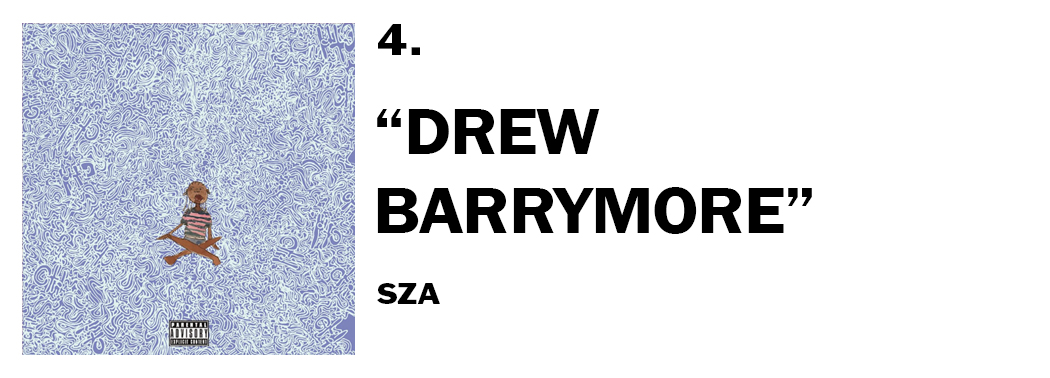
On “Drew Barrymore,” SZA lays it all to bear: shame, worthlessness, isolation—the parts of ourselves we’re made to believe we must hide. In that sense, there’s perhaps no more apt anthem for being a woman—or anyone marginalized, really—in 2017. The track, inspired by SZA’s love of Barrymore’s underdog roles in 90s teen flicks, is an ode to coming in second, to being the perpetual other, and ultimately, realizing that those barriers and put downs are self-constructed. Which isn’t to say those who enable them get a pass. SZA is as ruthless with the song’s paramore subject as she is with herself, a dichotomy echoed in the rapped invectives of the song’s verses and the ache of its sung choruses. All the while, she casts her weaknesses like a gauntlet: “I get so lonely, I forget what I’m worth / We get so lonely, we pretend that this works,” she sings, grappling with a relationship she knows is toxic, but can’t bring herself to walk away from. The thing is, they’re not really weaknesses if you own them, are they? Strength, she shows us, is less about being tough than being unapologetic. —Andrea Domanick | LISTEN

If you haven’t shouted along to the “CARDI” that opens this song at least once, then you’ve had an empty year. Cardi B, though, has enjoyed a tremendous 2017. Her Gangsta Bitch Music Vol. 2 mixtape dropped in January, but the song that’s defined her come-up wasn’t even on it. Instead, “Bodak Yellow” stands on its own, a Kodak Black-inspired, husky-voiced, spacious, hi-hat-tapping anthem for charting your own destiny and loudly reminding everyone of how far you’ve come. It is the musical manifestation of firmly saying “don’t touch me or talk to me without my permission,” and it is near-perfect.
Cardi has given women, particularly women of color, a song to hold close in a year that has highlighted further how much society treats them like dirt. There is a particular way a woman’s top lip curls as she spits out the “lil bitch” hook, and it has all the elegant menace of a long acrylic nail’s curve. It’s the sound of stiletto heels clacking against dancefloor, of a high ponytail’s swish, of a tight halter strap thwacking against clavicle.
Cardi turns her own name into a battle cry. Yes, her own story has been that of stripper to reality TV star to Billboard Hot 100 number one to award winner. But she invites you to revel in your own sexual prowess, your own earning potential, your own take-no-shit attitude. In the spaces left gaping in this sparse track’s production, you get to plug in (and yell) your narrative too. —Tshepo Mokoena | LISTEN
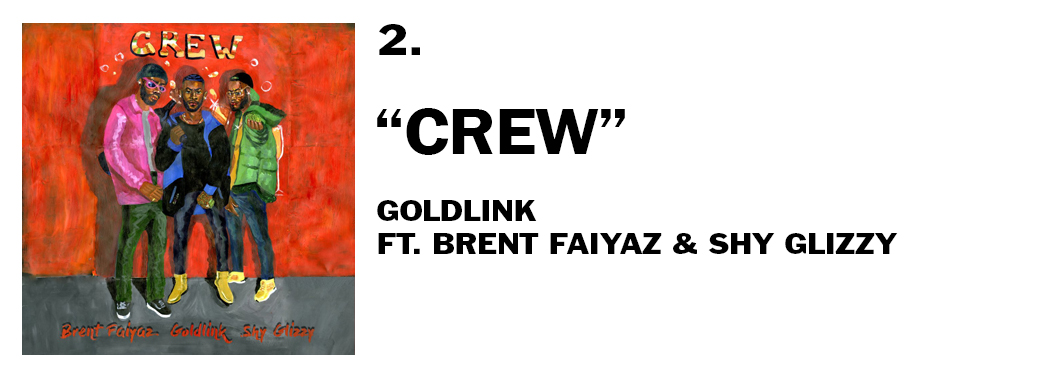
Some music can move you to dance. Some of it can make you think about the world in way that you hadn’t considered previously. But not all music can make you feel. That’s a quality reserved for the exceptional, and GoldLink’s “Crew” is one of those songs. For one, the DMV rapper’s biggest single to date is quite literally about the pricelessness of feeling yourself, how that confidence can inform how you move through the world, and how people start to treat you differently once you get in your bag. So per the law of attraction, it’s no wonder that the song has performed so well this year: it makes people feel like a million bucks.
A silky smooth, 90s-feeling hook from Brent Faiyaz is the anchor. Link’s verse sets the tone, with calculated pauses in his first few bars. DC rap legend Shy Glizzy pushes it over the top, sounding his most motivated in some time. “Crew” succeeds on sound, but it also helps the DMV plant a flag into rap’s soil as a scene to consider beyond its hyper-regional music. —Lawrence Burney | LISTEN

“Are you alright?”
Lil Uzi Vert asks this question at the beginning of “XO Tour Llif3,” and though he says that he’s quite fine, he repeatedly proves he’s not.
Not only is it cliche to say that “XO Tour Llif3” is a crack in Uzi’s party-hard facade, it’s also inaccurate. Uzi’s catalog is almost entirely cracks, and this song just happens to be the deepest of them all. He’s destructive: downing Xanax, blowing racks on Phantoms, and taking other dudes’ girlfriends to bed with him in a never-ending bender. Shortly after the now-infamous “SHE SAY I’M INSANE YEAH / I MIGHT BLOW MY BRAIN OUT” release, Uzi offers a chilling piece of insight on addiction and mental health, “I’m committed, not addicted, but it keep control of me / All the pain, now I can’t feel it.” It’s his choice to keep warding off misery with drugs, he’s sticking to it, and it feels great.
The listener may not agree with that POV, but it’s tough to dislike the song itself. “XO Tour Llif3” fits dramatic peaks and valleys into its brief runtime, the pop single as a three-act play. Its cross-audience appeal, uniting clubgoers and relapsed emo kids, is a result of its alloy-like construction. You can’t tell where the hip-hop ends and rock begins. Simply put, “XO Tour Llif3” is 2017. It’s a cry for help. It bangs in the whip. It’s nihilistic. It’s the future. It celebrates death. It’s full of life. In the context of a guard-changing year for music, this idiosyncratic little throwaway becoming an inescapable hit couldn’t act as a neater, more inspiring summary.
So, that question again. In December 2017, are you alright? You might say “no,” you might say “I guess,” but even when accounting for the world’s broader woes, no one’s ever really “alright.” You’re still alive, though. Existential crises aren’t a new thing that 2017 invented, so the best option is to keep going. Music that’s as perfect and all-encompassing as “XO Tour Llif3” is just one reason to do so. Who cares if you cry? —Phil Witmer | LISTEN
Follow Noisey on Twitter .
More
From VICE
-

Screenshot: Nintendo -

Illustration by Reesa. -

Screenshot: Shaun Cichacki -

(Photo by Niels van Iperen/Getty Images)
